#12. Property Buying Companies
Explore tagged Tumblr posts
Text
How to Sell Your Property Quickly and Easily Online for Cash

If you’re looking to sell your property quickly, selling online is one of the fastest and most convenient options. Many people today are opting to sell their property for cash to avoid the lengthy process of traditional home selling. With just a few clicks, you can connect with trusted buyers who can make a fast offer, often within 24-48 hours.
When you choose to sell your property fast, online platforms can simplify the process by offering a direct sale to cash home buyers. This allows you to skip the traditional route of listings, showings, and negotiations. Whether you're facing financial difficulties, relocating, or just want to move quickly, online platforms provide a hassle-free way to sell property quickly.
By deciding to sell my property online, you can experience a smooth, fast transaction and get the cash you need without the stress of a lengthy sale.
#1. Sell Property Quickly#2. Sell House for Cash#3. Fast Property Sale#4. Sell My House Online#5. Cash Home Buyers#6. Quick House Sale#7. Sell Home Fast#8. Online Property Sale#9. Cash for Property#10. Sell Property for Cash#11. Fast Home Sale Online#12. Property Buying Companies#13. Sell My Property Fast#14. Quick Cash Offer for House#15. Sell Home Without Hassle#16. Sell House Without Agents#17. Easy Property Sale#18. Get Cash for Your Home#19. Fast Cash Property Buyers#20. Online House Sale Process
0 notes
Text
"Palestine was heralded as ‘a land without a people for a people without a land’, and the Naqab in particular was characterized as a desert in need of technologically advanced (Zionist) pioneers to make it bloom. In actual fact, the estimated 65,000–90,000 Palestinian Arabs populating the Naqab Desert prior to the 1948 war were organized into 95 tribes, and engaged in animal husbandry and seasonal agriculture. Turkish records dating as far back as the sixteenth century show that Palestinian Bedouin owned, cultivated and paid taxes on land; and that cultivation was extensive, particularly in the more fertile, less arid northern and northwestern Naqab. Palestinian Bedouin cultivation in the Naqab was documented by European traveller accounts from the mid- to late-1800s, as well as Zionist explorer accounts from the late 1800s and early 1900s. Reports produced both by British Mandate authorities and the Zionist Movement’s Palestine Land Development Company in the early to mid-1900s indicated that over 2 million dunams were owned and cultivated by Naqab Palestinians. The great majority of Naqab Palestinians held their land under customary Bedouin law. Neither the Ottoman or British Mandate governments ever completed land surveys of the vast Naqab region; however, they both recognized the Naqab Palestinians’ traditional land ownership system, at the collective tribal and individual levels.
... However, prior to the 1948 war, Zionist leaders such as Ben-Gurion denied Naqab Palestinian land ownership, and characterized the Naqab as ‘No Man’s Land. It has no legal owners and anyone who cultivates it with the permission of the government is entitled to become its owner, according to a Turkish law, which still prevails in Palestine’. He rejected the idea of purchasing land in the Naqab, saying to his staff: ‘In the Negev we will not buy land. We will conquer it. You are forgetting that we are at war.’ The 1948 war/Palestinian Nakba (Catastrophe) resulted in large-scale expulsion of Palestinian population, and internal displacement of many who remained in the territory that became the State of Israel. Studies of the internally displaced Palestinians have generally not included the Bedouin Palestinians in the Naqab; aside from noting that the official governmental numbers did not include them, or that a much higher proportion of the population was displaced, as compared to other regions. They, indeed, faced the most extensive displacement and dispossession, with 12 of the 19 tribes that remained in the Israeli state forced to move from their fertile lands in the northwestern Naqab to the infertile, arid region of the Seig. This resulted in nearly two thirds of the communities losing their land, property and possessions. Although Israeli authorities initially told them that the displacement was temporary, and they would be allowed to return to their lands, this never occurred. Instead, an arsenal of laws was enacted and applied throughout Israel to transfer Palestinian owned land to the Israeli state. ... Recently uncovered archives and declassified government documents confirm that the displacement and land acquisition was not coincidental, but occurred according to an orderly, large-scale state plan to expel Palestinian citizens from the northwestern Naqab, with the goal of severing their physical ties to the land, and transferring this land to the possession of the state. Moshe Dayan, who commanded the military operation, wrote: ‘It’s now possible to transfer most of the Bedouin in the vicinity of [Kibbutz] Shoval to areas south of the Hebron-Be’er Sheva road. Doing so will clear around 60,000 dunams in which we can farm and establish communities.’ Although security issues were given as a rationale for the transfer, Dayan also clearly stated: ‘Transferring the Bedouin to new territories will annul their rights as landowners and they will become tenants on government lands.’ The military government carried out the operation using a mix of threats, violence, bribery and fraud; but were careful never to give the displaced Naqab Palestinians written transfer orders, because such an operation for the purpose of land acquisition was illegal. Oral Palestinian histories of threats, violence and arrests were confirmed by archival kibbutz and state records. Although the official government story was that Naqab Palestinians voluntarily left their lands, declassified government records from the time document the ‘Bedouin resistance and protests, the stubbornness with which they tried to hold onto their land, even at the cost of hunger and thirst, not to mention the army’s threats and violence’. Archival kibbutz records also documented the military government’s use of many methods to force the Bedouin to leave their lands, including stopping their food supplies for months."
Ismael Abu-Saad, "Al-Naqab: The Unfinished Zionist Settler-colonial Conquest of its Elusive 'Last Frontier,' and Indigenous Palestinian Bedouin Arab Resistance," in Decolonizing the Study of Palestine: Indigenous Perspectives and Settler Colonialism (2023)
295 notes
·
View notes
Text
The moral injury of having your work enshittified

This Monday (November 27), I'm appearing at the Toronto Metro Reference Library with Facebook whistleblower Frances Haugen.
On November 29, I'm at NYC's Strand Books with my novel The Lost Cause, a solarpunk tale of hope and danger that Rebecca Solnit called "completely delightful."

This week, I wrote about how the Great Enshittening – in which all the digital services we rely on become unusable, extractive piles of shit – did not result from the decay of the morals of tech company leadership, but rather, from the collapse of the forces that discipline corporate wrongdoing:
https://locusmag.com/2023/11/commentary-by-cory-doctorow-dont-be-evil/
The failure to enforce competition law allowed a few companies to buy out their rivals, or sell goods below cost until their rivals collapsed, or bribe key parts of their supply chain not to allow rivals to participate:
https://www.engadget.com/google-reportedly-pays-apple-36-percent-of-ad-search-revenues-from-safari-191730783.html
The resulting concentration of the tech sector meant that the surviving firms were stupendously wealthy, and cozy enough that they could agree on a common legislative agenda. That regulatory capture has allowed tech companies to violate labor, privacy and consumer protection laws by arguing that the law doesn't apply when you use an app to violate it:
https://pluralistic.net/2023/04/12/algorithmic-wage-discrimination/#fishers-of-men
But the regulatory capture isn't just about preventing regulation: it's also about creating regulation – laws that make it illegal to reverse-engineer, scrape, and otherwise mod, hack or reconfigure existing services to claw back value that has been taken away from users and business customers. This gives rise to Jay Freeman's perfectly named doctrine of "felony contempt of business-model," in which it is illegal to use your own property in ways that anger the shareholders of the company that sold it to you:
https://pluralistic.net/2023/11/09/lead-me-not-into-temptation/#chamberlain
Undisciplined by the threat of competition, regulation, or unilateral modification by users, companies are free to enshittify their products. But what does that actually look like? I say that enshittification is always precipitated by a lost argument.
It starts when someone around a board-room table proposes doing something that's bad for users but good for the company. If the company faces the discipline of competition, regulation or self-help measures, then the workers who are disgusted by this course of action can say, "I think doing this would be gross, and what's more, it's going to make the company poorer," and so they win the argument.
But when you take away that discipline, the argument gets reduced to, "Don't do this because it would make me ashamed to work here, even though it will make the company richer." Money talks, bullshit walks. Let the enshittification begin!
https://pluralistic.net/2023/11/22/who-wins-the-argument/#corporations-are-people-my-friend
But why do workers care at all? That's where phrases like "don't be evil" come into the picture. Until very recently, tech workers participated in one of history's tightest labor markets, in which multiple companies with gigantic war-chests bid on their labor. Even low-level employees routinely fielded calls from recruiters who dangled offers of higher salaries and larger stock grants if they would jump ship for a company's rival.
Employers built "campuses" filled with lavish perks: massages, sports facilities, daycare, gourmet cafeterias. They offered workers generous benefit packages, including exotic health benefits like having your eggs frozen so you could delay fertility while offsetting the risks normally associated with conceiving at a later age.
But all of this was a transparent ruse: the business-case for free meals, gyms, dry-cleaning, catering and massages was to keep workers at their laptops for 10, 12, or even 16 hours per day. That egg-freezing perk wasn't about helping workers plan their families: it was about thumbing the scales in favor of working through your entire twenties and thirties without taking any parental leave.
In other words, tech employers valued their employees as a means to an end: they wanted to get the best geeks on the payroll and then work them like government mules. The perks and pay weren't the result of comradeship between management and labor: they were the result of the discipline of competition for labor.
This wasn't really a secret, of course. Big Tech workers are split into two camps: blue badges (salaried employees) and green badges (contractors). Whenever there is a slack labor market for a specific job or skill, it is converted from a blue badge job to a green badge job. Green badges don't get the food or the massages or the kombucha. They don't get stock or daycare. They don't get to freeze their eggs. They also work long hours, but they are incentivized by the fear of poverty.
Tech giants went to great lengths to shield blue badges from green badges – at some Google campuses, these workforces actually used different entrances and worked in different facilities or on different floors. Sometimes, green badge working hours would be staggered so that the armies of ragged clickworkers would not be lined up to badge in when their social betters swanned off the luxury bus and into their airy adult kindergartens.
But Big Tech worked hard to convince those blue badges that they were truly valued. Companies hosted regular town halls where employees could ask impertinent questions of their CEOs. They maintained freewheeling internal social media sites where techies could rail against corporate foolishness and make Dilbert references.
And they came up with mottoes.
Apple told its employees it was a sound environmental steward that cared about privacy. Apple also deliberately turned old devices into e-waste by shredding them to ensure that they wouldn't be repaired and compete with new devices:
https://pluralistic.net/2023/09/22/vin-locking/#thought-differently
And even as they were blocking Facebook's surveillance tools, they quietly built their own nonconsensual mass surveillance program and lied to customers about it:
https://pluralistic.net/2022/11/14/luxury-surveillance/#liar-liar
Facebook told employees they were on a "mission to connect every person in the world," but instead deliberately sowed discontent among its users and trapped them in silos that meant that anyone who left Facebook lost all their friends:
https://www.eff.org/deeplinks/2021/08/facebooks-secret-war-switching-costs
And Google promised its employees that they would not "be evil" if they worked at Google. For many googlers, that mattered. They wanted to do something good with their lives, and they had a choice about who they would work for. What's more, they did make things that were good. At their high points, Google Maps, Google Mail, and of course, Google Search were incredible.
My own life was totally transformed by Maps: I have very poor spatial sense, need to actually stop and think to tell my right from my left, and I spent more of my life at least a little lost and often very lost. Google Maps is the cognitive prosthesis I needed to become someone who can go anywhere. I'm profoundly grateful to the people who built that service.
There's a name for phenomenon in which you care so much about your job that you endure poor conditions and abuse: it's called "vocational awe," as coined by Fobazi Ettarh:
https://www.inthelibrarywiththeleadpipe.org/2018/vocational-awe/
Ettarh uses the term to apply to traditionally low-waged workers like librarians, teachers and nurses. In our book Chokepoint Capitalism, Rebecca Giblin and I talked about how it applies to artists and other creative workers, too:
https://chokepointcapitalism.com/
But vocational awe is also omnipresent in tech. The grandiose claims to be on a mission to make the world a better place are not just puffery – they're a vital means of motivating workers who can easily quit their jobs and find a new one to put in 16-hour days. The massages and kombucha and egg-freezing are not framed as perks, but as logistical supports, provided so that techies on an important mission can pursue a shared social goal without being distracted by their balky, inconvenient meatsuits.
Steve Jobs was a master of instilling vocational awe. He was full of aphorisms like "we're here to make a dent in the universe, otherwise why even be here?" Or his infamous line to John Sculley, whom he lured away from Pepsi: "Do you want to sell sugar water for the rest of your life or come with me and change the world?"
Vocational awe cuts both ways. If your workforce actually believes in all that high-minded stuff, if they actually sacrifice their health, family lives and self-care to further the mission, they will defend it. That brings me back to enshittification, and the argument: "If we do this bad thing to the product I work on, it will make me hate myself."
The decline in market discipline for large tech companies has been accompanied by a decline in labor discipline, as the market for technical work grew less and less competitive. Since the dotcom collapse, the ability of tech giants to starve new entrants of market oxygen has shrunk techies' dreams.
Tech workers once dreamed of working for a big, unwieldy firm for a few years before setting out on their own to topple it with a startup. Then, the dream shrank: work for that big, clumsy firm for a few years, then do a fake startup that makes a fake product that is acquihired by your old employer, as an incredibly inefficient and roundabout way to get a raise and a bonus.
Then the dream shrank again: work for a big, ugly firm for life, but get those perks, the massages and the kombucha and the stock options and the gourmet cafeteria and the egg-freezing. Then it shrank again: work for Google for a while, but then get laid off along with 12,000 co-workers, just months after the company does a stock buyback that would cover all those salaries for the next 27 years:
https://pluralistic.net/2023/09/10/the-proletarianization-of-tech-workers/
Tech workers' power was fundamentally individual. In a tight labor market, tech workers could personally stand up to their bosses. They got "workplace democracy" by mouthing off at town hall meetings. They didn't have a union, and they thought they didn't need one. Of course, they did need one, because there were limits to individual power, even for the most in-demand workers, especially when it came to ghastly, long-running sexual abuse from high-ranking executives:
https://www.nytimes.com/2018/10/25/technology/google-sexual-harassment-andy-rubin.html
Today, atomized tech workers who are ordered to enshittify the products they take pride in are losing the argument. Workers who put in long hours, missed funerals and school plays and little league games and anniversaries and family vacations are being ordered to flush that sacrifice down the toilet to grind out a few basis points towards a KPI.
It's a form of moral injury, and it's palpable in the first-person accounts of former workers who've exited these large firms or the entire field. The viral "Reflecting on 18 years at Google," written by Ian Hixie, vibrates with it:
https://ln.hixie.ch/?start=1700627373
Hixie describes the sense of mission he brought to his job, the workplace democracy he experienced as employees' views were both solicited and heeded. He describes the positive contributions he was able to make to a commons of technical standards that rippled out beyond Google – and then, he says, "Google's culture eroded":
Decisions went from being made for the benefit of users, to the benefit of Google, to the benefit of whoever was making the decision.
In other words, techies started losing the argument. Layoffs weakened worker power – not just to defend their own interest, but to defend the users interests. Worker power is always about more than workers – think of how the 2019 LA teachers' strike won greenspace for every school, a ban on immigration sweeps of students' parents at the school gates and other community benefits:
https://pluralistic.net/2023/04/23/a-collective-bargain/
Hixie attributes the changes to a change in leadership, but I respectfully disagree. Hixie points to the original shareholder letter from the Google founders, in which they informed investors contemplating their IPO that they were retaining a controlling interest in the company's governance so that they could ignore their shareholders' priorities in favor of a vision of Google as a positive force in the world:
https://abc.xyz/investor/founders-letters/ipo-letter/
Hixie says that the leadership that succeeded the founders lost sight of this vision – but the whole point of that letter is that the founders never fully ceded control to subsequent executive teams. Yes, those executive teams were accountable to the shareholders, but the largest block of voting shares were retained by the founders.
I don't think the enshittification of Google was due to a change in leadership – I think it was due to a change in discipline, the discipline imposed by competition, regulation and the threat of self-help measures. Take ads: when Google had to contend with one-click adblocker installation, it had to constantly balance the risk of making users so fed up that they googled "how do I block ads?" and then never saw another ad ever again.
But once Google seized the majority of the mobile market, it was able to funnel users into apps, and reverse-engineering an app is a felony (felony contempt of business-model) under Section 1201 of the Digital Millennium Copyright Act. An app is just a web-page wrapped in enough IP to make it a crime to install an ad-blocker.
And as Google acquired control over the browser market, it was likewise able to reduce the self-help measures available to browser users who found ads sufficiently obnoxious to trigger googling "how do I block ads?" The apotheosis of this is the yearslong campaign to block adblockers in Chrome, which the company has sworn it will finally do this coming June:
https://www.tumblr.com/tevruden/734352367416410112/you-have-until-june-to-dump-chrome
My contention here is not that Google's enshittification was precipitated by a change in personnel via the promotion of managers who have shitty ideas. Google's enshittification was precipitated by a change in discipline, as the negative consequences of heeding those shitty ideas were abolished thanks to monopoly.
This is bad news for people like me, who rely on services like Google Maps as cognitive prostheses. Elizabeth Laraki, one of the original Google Maps designers, has published a scorching critique of the latest GMaps design:
https://twitter.com/elizlaraki/status/1727351922254852182
Laraki calls out numerous enshittificatory design-choices that have left Maps screens covered in "crud" – multiple revenue-maximizing elements that come at the expense of usability, shifting value from users to Google.
What Laraki doesn't say is that these UI elements are auctioned off to merchants, which means that the business that gives Google the most money gets the greatest prominence in Maps, even if it's not the best merchant. That's a recurring motif in enshittified tech platforms, most notoriously Amazon, which makes $31b/year auctioning off top search placement to companies whose products aren't relevant enough to your query to command that position on their own:
https://pluralistic.net/2023/04/25/greedflation/#commissar-bezos
Enshittification begets enshittification. To succeed on Amazon, you must divert funds from product quality to auction placement, which means that the top results are the worst products:
https://pluralistic.net/2023/11/06/attention-rents/#consumer-welfare-queens
The exception is searches for Apple products: Apple and Amazon have a cozy arrangement that means that searches for Apple products are a timewarp back to the pre-enshittification Amazon, when the company worried enough about losing your business to heed the employees who objected to sacrificing search quality as part of a merchant extortion racket:
https://www.businessinsider.com/amazon-gives-apple-special-treatment-while-others-suffer-junk-ads-2023-11
Not every tech worker is a tech bro, in other words. Many workers care deeply about making your life better. But the microeconomics of the boardroom in a monopolized tech sector rewards the worst people and continuously promotes them. Forget the Peter Principle: tech is ruled by the Sam Principle.
As OpenAI went through four CEOs in a single week, lots of commentators remarked on Sam Altman's rise and fall and rise, but I only found one commentator who really had Altman's number. Writing in Today in Tabs, Rusty Foster nailed Altman to the wall:
https://www.todayintabs.com/p/defective-accelerationism
Altman's history goes like this: first, he founded a useless startup that raised $30m, only to be acquired and shuttered. Then Altman got a job running Y Combinator, where he somehow failed at taking huge tranches of equity from "every Stanford dropout with an idea for software to replace something Mommy used to do." After that, he founded OpenAI, a company that he claims to believe presents an existential risk to the entire human risk – which he structured so incompetently that he was then forced out of it.
His reward for this string of farcical, mounting failures? He was put back in charge of the company he mis-structured despite his claimed belief that it will destroy the human race if not properly managed.
Altman's been around for a long time. He founded his startup in 2005. There've always been Sams – of both the Bankman-Fried varietal and the Altman genus – in tech. But they didn't get to run amok. They were disciplined by their competitors, regulators, users and workers. The collapse of competition led to an across-the-board collapse in all of those forms of discipline, revealing the executives for the mediocre sociopaths they always were, and exposing tech workers' vocational awe for the shabby trick it was from the start.

If you'd like an essay-formatted version of this post to read or share, here's a link to it on pluralistic.net, my surveillance-free, ad-free, tracker-free blog:
https://pluralistic.net/2023/11/25/moral-injury/#enshittification
#pluralistic#moral injury#enshittification#worker power#google#dont be evil#monopoly#sam altman#openai#vocational awe#making a dent in the universe
561 notes
·
View notes
Text
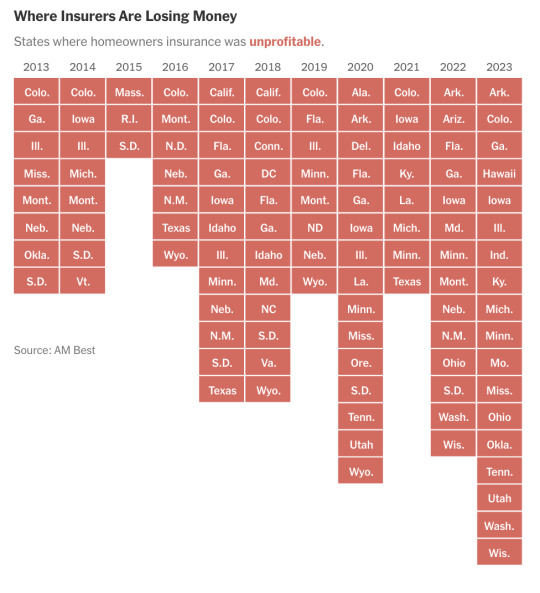
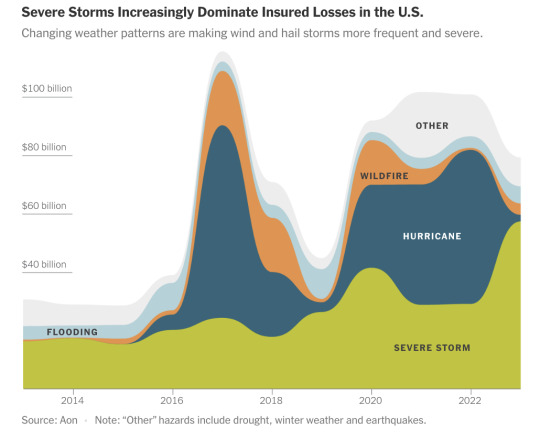
Excerpt from this story from the New York Times:
At first glance, Dave Langston’s predicament seems similar to headaches facing homeowners in coastal states vulnerable to catastrophic hurricanes: As disasters have become more frequent and severe, his insurance company has been losing money. Then, it canceled his coverage and left the state.
But Mr. Langston lives in Iowa.
Relatively consistent weather once made Iowa a good bet for insurance companies. But now, as a warming planet makes events like hail and wind storms worse, insurers are fleeing.
Mr. Langston spent months trying to find another company to insure the townhouses, on a quiet cul-de-sac at the edge of Cedar Rapids, that belong to members of his homeowners association. Without coverage, “if we were to have damage that hit all 17 units, we’re looking at bankruptcy for all of us,” he said.
The insurance turmoil caused by climate change — which had been concentrated in Florida, California and Louisiana — is fast becoming a contagion, spreading to states like Iowa, Arkansas, Ohio, Utah and Washington. Even in the Northeast, where homeowners insurance was still generally profitable last year, the trends are worsening.
In 2023, insurers lost money on homeowners coverage in 18 states, more than a third of the country, according to a New York Times analysis of newly available financial data. That’s up from 12 states five years ago, and eight states in 2013. The result is that insurance companies are raising premiums by as much as 50 percent or more, cutting back on coverage or leaving entire states altogether. Nationally, over the last decade, insurers paid out more in claims than they received in premiums, according to the ratings firm Moody’s, and those losses are increasing.
The growing tumult is affecting people whose homes have never been damaged and who have dutifully paid their premiums, year after year. Cancellation notices have left them scrambling to find coverage to protect what is often their single biggest investment. As a last resort, many are ending up in high-risk insurance pools created by states that are backed by the public and offer less coverage than standard policies. By and large, state regulators lack strategies to restore stability to the market.
Insurers are still turning a profit from other lines of business, like commercial and life insurance policies. But many are dropping homeowners coverage because of losses.
Tracking the shifting insurance market is complicated by the fact it is not regulated by the federal government; attempts by the Treasury Department to simply gather data have been rebuffed by some state regulators.
The turmoil in insurance markets is a flashing red light for an American economy that is built on real property. Without insurance, banks won’t issue a mortgage; without a mortgage, most people can’t buy a home. With fewer buyers, real estate values are likely to decline, along with property tax revenues, leaving communities with less money for schools, police and other basic services.
And without sufficient insurance, people struggle to rebuild after disasters. Last year, storms, wildfires and other disasters pushed 2.5 million American adults out of their homes, according to census data, including at least 830,000 people who were displaced for six months or longer.
121 notes
·
View notes
Text

Union Plaza Hotel & Casino, July 1971
The hotel was built on the site of the former Union Pacific depot and Greyhound bus terminal. Two companies financed the hotel: Upland Industries, a subsidiary of Union Pacific Corp, and Scott Corp. directed by Frank E. Scott. The Scott Corp. was the landlord, Scott was the CEO and president of the hotel, with partners Sen. Howard Cannon, and downtown casino stalwarts J.K. Houssels Jr, Jackie Gaughan, Sam Boyd, and Bill Boyd, who managed the “world’s largest casino.”
'70: Aug. 10, Groundbreaking. (LA Times 8/9/70, RJ 7/1/71)
'70: Nov., Union Station demolished. (RJ 11/24/70)
'71: May 2, Final UP train service. Amtrak was established, and passenger service through Las Vegas is suspended.
'71: Jul. 2, Union Plaza Hotel & Casino is opened. Architects: Zick & Sharp (Las Vegas) in association with Stanley J. How (Omaha). Contractor: Blount-Yoxen Construction Co. The hotel complex contained a bus station, 500-seat showroom, 2nd story pool in front of the hotel, and an adjacent parking garage. The 504-room hotel was roughly the same size as the Fremont Hotel and smaller than some on the Strip, but it boasted the largest casino floor in Las Vegas at 66,000 sq ft.
'75: Jul., Sports book addition. KDWN Radio 720 AM begins broadcasting from the hotel with a station on the 2nd floor.
'79: Oct. 28, Amtrak’s Desert Wind line through Las Vegas begins the first regularly scheduled service since ‘71. Small room and platform in the rear of the hotel is used as the depot.
'81: Apr., Rooftop sign and lights changed. Design by Charles Barnard, Ad Art.
'82: Construction of 26-story south tower, parking garage, and conversion of the front pool to restaurant designed by Louis Pereira. (RJ 3/16/82, 9/19/82, 10/28/82)
'83: Center Stage restaurant opens in Jan. (RJ 1/23/83) Mural depicting the past, present, and future of passenger rail service created in the hotel between the lobby and depot area. Tower topped off in Apr. and opened in fall. Total rooms: 1030. (RJ 4/23/83, 10/20/83)
'90-'93: Jackie Gaughan acquires the holdings of Union Plaza founder Frank Scott, followed by Upland’s participation in '93, becoming the majority shareholder and ending the relationship with Union Pacific. The hotel is renamed “Jackie Gaughan’s Plaza” circa ’92, though the signs remain unchanged, with “Union” on the rooftop sign for several years.
2004: Mar. 26, Plaza is sold. Union Plaza Hotel & Casino Inc, Exber Inc and Gaughan South sell Plaza, Las Vegas Club, Gold Spike, Western Hotel, and 60 acres of land and non-gaming properties to Barrick Gaming and Tamares Real Estate for $82M. The Barrick group plans a "themed street behind the Plaza which will re-create the ambience of old downtown Las Vegas." (RJ 3/26/2004)
2005: Tamares buys Barrick’s interest in Plaza hotel and the Las Vegas properties; Larry Woolf managing.
2009: Firefly opens in the former Center Stage restaurant; Oscar's Steakhouse opens in its place in 2011.
2014: Jonathan Jossel takes over as the CEO of the Plaza, the youngest non-restricted gaming licensees in Las Vegas.


Construction in 1971. The first photo is dated 1/12/1971, Nevada State Museum Las Vegas.

Fremont & Casino Center, Apr. 1971. Union Plaza construction past Main St.

Sal Sagev Hotel and Golden Gate Casino; Union Plaza; Las Vegas Club and the Dugout restaurant. 1971. Photo via Plaza Hotel.


Postcards circa 1971.
Sources: UP Hotel Plans Ready for Signing. Las Vegas Review-Journal, 10/3/69; Work on 22-story hotel to start soon. Review-Journal, 8/2/70 p1; No Parking Here. Review-Journal, 8/10/70; Union Plaza Magic Hour Near. Review-Journal, 7/1/71; Plaza celebrates LV ‘uptown’. Review-Journal, 8/13/71; Rod Smith. Four Gaughan casinos pass to Barrick. Review-Journal, 3/26/2004; Howard Stutz. Lady Luck. Review-Journal, 12/13/2005; Oliver Lovat. A Golden Age for Downtown. GGB Magazine, 2021.
44 notes
·
View notes
Text
Elon Musk’s SpaceX has been accused of trespassing on land owned by US game company, Cards Against Humanity, for more than six months as per a lawsuit filed and announced on September 19, 2024. However, satellite imagery shows that the land has been in use for more than 12 months.
At time of writing, SpaceX had not replied to our request for comment. We have no evidence SpaceX knowingly trespassed on Cards Against Humanity’s land. They have not issued any public statement responding to the ongoing lawsuit.
The Cards Against Humanity case revolves around a stretch of land in Cameron County, Texas, where dozens of parcels of land lie adjacent to one another. Running alongside the Rio Grande River, these parcels sit right on the border between the US and Mexico. Several of the plots are owned by Space Exploration Technologies Corp, better known as ‘SpaceX’, but they are interspersed, often wedged between plots belonging to small businesses or individuals.
In 2017, Cards Against Humanity purchased parcel number 173555 (formerly known as lot 11) under the name Hole Holding LLC. They bought it in protest of former President Donald Trump’s border wall and with the intention of not developing it, but rather keeping it in its natural state. Cards Against Humanity crowdsourced funding to buy the land, stating that it received 150,000 separate donations of $15 each.
Cards Against Humanity told Bellingcat:
“Our lawsuit is based on SpaceX’s trespass and damage to our property through their extensive use of it for storage of construction materials and vehicles.”
In their lawsuit, they say a fence and a sign stating “No Trespassing” marked the edge of their site. They also state that the work being carried out on this land could make it appear as though their organisation is working with Musk and/or SpaceX’s contractors–something they say is “offensive” and could “be harmful to its reputation with its supporters.”
40 notes
·
View notes
Text

This home is an Airbnb short term rental, but it's so much fun, if I had $7.9M + $42mo. HOA to buy the 1993 estate in Clermont, FL, I would live in it full time. It has 12bds, 9ba on 54.38 acres. The price includes the business, so you get all the stuff with it.



This room with the full kitchen and huge screen TV has theater seating and look at the balconies with figures on them. The double doors say "Cinema," so I guess this is also the home theater, but it looks like a family room.

Tropical rainforest dining room with a carved table and chairs.


Arcade games, a pool table, and a TV area.

Plus another full kitchen with a table that looks like a baseball.

The bedrooms have themes- here we have a football field.

Ski chalet?

The baths are spacious, but basically white, nothing special.

Who wants the golf cart bed? And, simulated golf room.

Are you ready to rumble in the wrestling room?

The body builder's room.

Love the race car room.

Hockey.

Some coordinated baths are decorated.

The B-Ball room.

Baseball bunk room.

Ski ball. This is more my speed.

And, it has a cool bath.

Black light bunk room has a beachy motif.


Florida bird cage pool.

The description says 3 kitchens, but this is the 5th I've counted.

Picnic area. Guests have to share the house.

Outdoor games.

There's a boat house.

Looks like one of those swan pedal boats.

The house is managed by an outside company, but the new owner can choose to do it himself. Also, the current owner has more ideas that the new owner can add to the property. I'm a little disappointed that every single room is sports-themed.
71 notes
·
View notes
Text
this is the place to post about your knowledge and i’m thinking about my little royal sunangel (from the coquette hummingbird family) google deep-dive and i wanted to show you guys these rare little bastards!
this is a male (left) and female (right) sunangel, they’re sexually dichromatic (different colors indicate different sexes) and so, so teensy! they’re roughly 4.3-4.7 inches/10-12 cm long from their beak to their tail!


they’re as little in number as they are little in size, too. they are exclusively found in the bordering andes area ecuador and peru share, where there are subtropical elven forests (because everything about them deserves a pretty name). there are only 8 known sunangel habitats within this area. when documentation started, around the start of the 2010s, there were 12. the estimated population of this endangered bird is anywhere from 3-7 thousand. the royal sunangel population has been steadily — and scarily — declining since their discovery in 2009, and this is largely attributed to the deforestation due to frequent forest fires and the conversion of their habitats into agricultural fields.

it feels like the royal sunangel JUST got discovered, and the scientific community has only JUST started noting down how unique they are among their hummingbird family and birds at large, and now their delicate little frames and stubborn commitment to their habitat range might lead them to death’s door before i reach middle age and have the credentials or cause to observe them myself. ornithologists love these little guys because they feed in these little circuits so no two (super territorial) males may meet, and when they feed, they either stalk and eventually eat insects or take nectar from shrubs and flowers using the punctured feeding holes of some other animals’ labor. also, you know how hummingbirds famously hover while they feed? these hummingbirds are the only ones who don’t. they perch and relax (as is only sensible)!
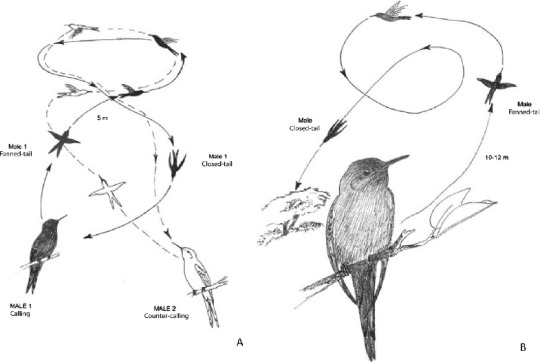
If you find them as charming as I do, or if you have a heart, you’re probably asking yourself how we go about conserving these birds in the first place.

well, on the agricultural front (which is more heavily an ecuadorian obstacle for these habitats), the situation feels more complicated. ecuador’s market relies on agricultural exports and i don’t see how tumblr users could make the government prioritize sustainability over profits. There are already conservation groups trying to fight that good fight and buy properties on these fragile biodiverse lands before agricultural companies can (you can punch in neoprimate.org for a good one, my link function isn’t working on here) and if you can donate a little to these initiatives you’d be contributing to the protection of tons of endangered species in the local areas.
another way to prevent habitat loss is by funding efforts to prevent the forest fires that frequently wipe out habitats around this area, especially those in peru (the area with the majority of sunangel habitats). there are legal and activist groups putting energy towards that that’s linked above, but another subtle improvement is to provide local farmers and residents with fire weather forecast devices. this way, everyone will be on the same page, and know that if it’s an arid/risky day to light a fire, they should act conscientiously. these devices are being circulated and groups are educating about and encouraging them to the local communities and could use some help in these links. below, i have a screenshot from an organization that doesn’t have a clear donation link for me, but i heavily encourage supporting, because ultimately i think local, sustainable, community-based and indigenous-prioritizing efforts are the way to go.
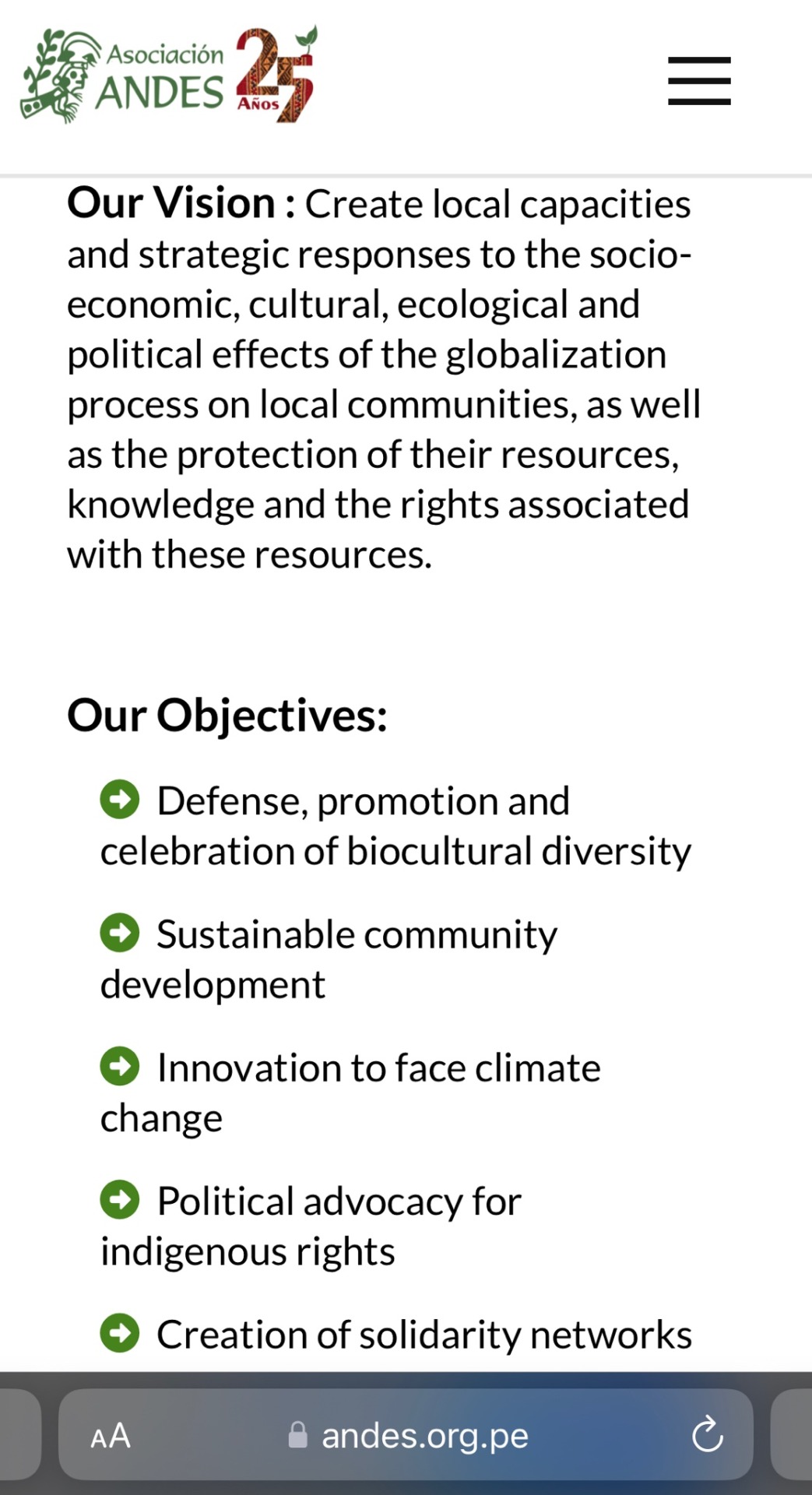
thanks so much for listening to my little spiel about these cuties, and i hope this information brightens your day and motivates you to care about the beautiful things we can protect. 💙💜


#conservación#conservation#ornithology#birdblr#birdlovers#birds#birdphotography#hummingbird#royal sunangel#peru#ecuador#conservatism#amazon#rainforest
453 notes
·
View notes
Note
Hi! For the pharmaceutical history: I'd like to know more about the history of loratadine. (If that one's boring, I'm sorry - I'm just really curious about allergy medicine history) Hope you're doing good!

Loratadine (Claritin, approved in 1988) was not the first nonsedating (second generation) antihistamine, but it wanted to be. Terfenadine (Seldane, from a competing manufacturer, approved in 1985) was the first. And because terfenadine got to the FDA just ahead of loratadine, loratadine was put on the FDA's backburner, delaying it's entrance to the market by over 3 years.
Loratadine made up for this by marketing the absolute sh*t out of their drug. If you were watching TV or reading magazines in the late 80s or early 90s, you probably remember. Loratadine was prescription only at the time. But direct-to-consumer advertising still had rules. By the early 1990's you couldn't have an ad that was selling a drug without a list of the side effects. And when you're trying to sell a non-drowsy antihistamine on the merit that it was non-drowsy, having to list the fact that the #1 side effect was still drowsiness didn't go over so well. This wasn't an issue in print so much- you could make the print about the side effects as small as you wanted, and who was going to read 3-pt font? But you couldn't do the same in a TV spot.
This was a problem for the company selling Claritin. So instead of making TV ads for the DRUG Claritin, they decided to sell the BRAND Claritin instead. So the ads just never said that Claritin was a drug, or what it did. They just said things like "Claritin is the non-drowsy brand" and "ask your doctor about Claritin" and the ever popular "live Claritin clear."
"But Ross," you might be asking yourself, "whatever did Claritin do to sell to the previously untapped market of children as drug consumers? I simply must know!" Well, you're in luck, because in 1998, and this is real, they released a 12-page Batman comic centered around Tim Drake having allergies that interfered with his crimefighting career. All other antihistamines made him too drowsy, so thank goodness he went to his doctor to get a prescription for Claritin!
You might also be wondering how insurance companies felt about having to pay for on-patent allergy medication (spoiler alert, they hated it, just like they hate paying for everything). Well, also in 1998, Anthem (the insurance company) petitioned the FDA to approve Claritin as an over-the-counter medication. If a medication was over the counter, they wouldn't have to pay for the medication, nor would they have to pay for the associated doctor's visits to get prescriptions for the medication. The FDA approved the petition, but it wasn't until 2002, when the patent had expired, that the company that made Claritin finally released an over the counter version. Even today, though, over the counter loratadine is so much more expensive than other second generation antihistamines. I couldn't figure out why this is, or why people keep buying brand name Claritin when there's like 5 other cheaper non-drowsy antihistamines to choose from.
Finally, I'll wrap up by telling you about the fate of terfenadine. See, turns out terfenadine is super cardiotoxic, especially when combined with certain antibiotics. It got taken off the market in 1997 after quite a few people died. It was replaced with fexofenadine, a metabolite of terfenadine without the cardiotoxic properties.
41 notes
·
View notes
Note
I never understood the concept of "doing taxes". Taxes are just there and you just pay them, like everytime you buy something it includes a tax you have no other choice but to pay it, what do you have to do?? (I live outside the USA)
Oh fun! I get to explain U.S. taxes!!
(disclaimer: if you're a young adult in America who will have to learn to do taxes soon, please don't take this as a reason to panic. It IS absurd and it is kinda stressful the first time you do it, but you get a handle on it, and filing services like FreeTaxUSA walk you through it and do all the math parts for you. [Though learning the math parts yourself is kinda smart if you want to understand what you're doing.])
(other disclaimer: I might have some details wrong because I'm a random blogger and not an accountant. Accountants don't maul me please.)
So it's true that tax is included when you buy something, but the whole "doing taxes" in America is about income tax.
My experience is with a company that does withholdings (god bless all you freelance workers figuring it all out for yourselves.) Withholdings means my company will estimate how much tax I should owe and take it out of each paycheck to give to the government. So from a $1,000 paycheck, they might withhold $300 to pay taxes with, and gives you the remaining $700.
But that might NOT be right. So in April every American has to go crunch all the numbers and figure out if they paid the right amount :) (chances are the answer is no).
We get a form called a W-2 (god bless, I only have one W-2 because I work just one full time job) which includes *adjust glasses*: employer's name, your info, your federal ID number, your social security number (partially redacted), your total wages, your federal income tax withheld, your social security tax withheld, your medicare tax withheld, your deferrals with things like 401k contributions, tips, dependent care benefits, STATE income tax withheld (my state has a 5% income tax, on top of the federal income tax) AAAAAAND other boxes I won't even bother with.
You feed this into software (like turbotax, which CHARGES you to do this, but I used FreeTaxUSA which had free federal filing and almost-free state filing) - RIGHT, you file federal and state SEPARATELY. And you owe/receive SEPARATE amounts.
America has tax brackets, which means you owe x% of money you make between--actually, lemme get the fucking chart

fucking delightful.
So if you make $50,000, as a single filer, you owe 10% of the first $10,275, then you owe 12% of the next $31,500 (that's the amount between $10,275-$41,775, in the second row), then 22% of the remaining $8,225 (cough and then also state income tax if you have it cough). It's a little bit like filling up a thermometer, and the amount between each tick mark is what you owe x% of.
BUT WAIT. THERE'S DEDUCTIONS.
DEDUCTIONS are where most of the complexity comes from. Because there's like 1,000 random things that can give you a tax break. And there's also the standard deduction of $12,950.
What's the deduction? It's an amount of your income that qualifies as tax-exempt. So for the $50,000-earner, if they go with the standard deduction of $12,950, then only $37,050 of their income is taxable. So FORGET that calculation above, it's now 10% of the first $10,275, and 12% of the remaining $26,775
But if your itemized deduction is higher than your standard deduction, it's in your interest to calculate all your itemized deductions and use those, if they add up to more than $12,950
My itemized deductions were almost higher than the $12,950, between my state income tax contribution, property tax contribution, and mortgage interest payments. Other people might have a fuckton of other things--uh like dependents, business expenses, uh I'm not even sure since I skim past all the ones that don't apply to me.
OH, ALSO, THERE ARE OTHER FORMS YOU MIGHT HAVE TO PROVIDE BEYOND THE W-2. There are 1099-INT forms for interest made on bank accounts, 1099-DIV forms for money made from stock dividends, and others I don't even know about.
And all my knowledge and experiences comes as someone with relatively simple taxes by U.S. standards.
(The state taxes then have their own things and own deductions and whatever. They're usually kinda less complicated than federal, but they're a separate thing you have to file.)
And after you do all that, it figures out how much tax you SHOULD owe, how much you ACTUALLY paid, and tells you the difference that you owe/are owed.
I got back a decent amount of money in 2019 and 2020. 2021 was preeettty much even. 2022 I OWE a lot of money because, fuck it, I dunno.
298 notes
·
View notes
Text
re: Sussex divorce etc. I read all the time that all their revenue and expenses are ran through various companies ( 12 incorporated in Delaware and Wyoming, and Archewell). The House was purchased via a trust created for this purpose.
In the event of a divorce, do they split ownership of all these companies 50/ 50 as per california state laws? How does alimony and child support work when everything is in company names and not their personal property?
For tax purposes i see the advantage of putting everything into Foundations, companies and trusts, but it seems complications arise in the event of divorce espevially when those companies are registered out of state. Which state's laws would they satisfy?
Further, i don't think Charles will help with the divorce ie supply lawyers and advise. FOR SURE he isn't on the hook for money because several ex-royals have tried to claim family dynasty wealth and lost which has set a legal precedent - see Tessa of Luxemborg and *Haya of Dubai.
*Haya of Dubai got a large settlement ( roughly £1/2B) which clouds the fact that in reality she got very little. Prior to the divorce, she purchased 2 large properties for herself in UK - one is in London next to KP plus she had a fortune in jewellery collected over the course of the marriage.
Aside from her properties, clothing and jewellery, she asked for over £1B for alimony plus her children's trustfunds, child support AND security.
Judge awarded her the properties, clothing, jewellery, children's trustfunds, child support and security. The alimony demand was slashed to less than £50M. The biggest chunk of her settlement ( almost 3/4 of entire settlement) was for security which the judge said would be at the highest level that money can buy for her and her kids' lifetimes as he agreed that her ex- Dubai hubby presented a clear and present danger for their lifetimes.
On a different note, i still shudder at the hostage video Princess Latifa of Dubai posted to youtube before she disappeared to be reprogrammed. That video probably saved her life and or gave her bargaining chips for better treatment unlike her sister Princess Shamsa who hasn't been seen in public or by rest of her family since her abduction in the early 00s.
27 notes
·
View notes
Text
Love Like Ghosts (Chapter 14) -- a Shigaraki x f!Reader fic
You knew the empty house in a quiet neighborhood was too good to be true, but you were so desperate to get out of your tiny apartment that you didn't care, and now you find yourself sharing space with something inhuman and immensely powerful. As you struggle to coexist with a ghost whose intentions you're unsure of, you find yourself drawn unwillingly into the upside-down world of spirits and conjurers, and becoming part of a neighborhood whose existence depends on your house staying exactly as it is, forever. But ghosts can change, just like people can. And as your feelings and your ghost's become more complex and intertwined, everything else begins to crumble. (cross-posted to Ao3)
Chapters: 1 2 3 4 5 6 7 8 9 10 11 12 13 14 15 16 17 18 19 20 21
Chapter 14
There’s something wrong with your house, but you knew that when you bought it. Right now, your house, like everybody else’s, is a total mess. Your fence is down, but Keigo’s yard is scorched lifeless, and the front façade of Aizawa’s house looks like a whole construction crew took a wrecking ball to it. You’ve all been fighting with your insurance companies to make them pay to fix the damage, which involves coming up with a reason for the damages that’s not a bunch of ghosts fighting to the death. Weirdly enough, it’s Tomura who comes up with the explanation: A tornado. The insurance companies buy it, given the reports of unexpectedly high winds that swept over your side of town that night. Sort of. Enough that you all get the repair work at least partially paid for.
You can’t skip work, and you don’t want people messing with the house while you’re not there, so Magne comes over to observe the workers from just outside the property line. The other option was Tomura materializing and staying that way for the duration of the repair, and Tomura’s back to conserving power for when you get home. Now that he knows you like hanging out with him, he’s extremely hard to put off.
The repairs aren’t the only new thing in the neighborhood. The neighborhood’s also got three new residents – Natsu, Nemuri, and the Shirakumo-ghost hybrid that’s going variously by Oboro (their human name) and Kurogiri (their name as a ghost). Natsu hangs out in Keigo’s house, while Nemuri and Oboro live with Aizawa and Hizashi. You’ve got no idea how Aizawa and Shinsou cope with being completely outnumbered by ghosts. The original suggestion was for Kurogiri to stay with you and Tomura, but Tomura rejected that at lightning speed, for reasons he wouldn’t share but were apparently clear to every last ghost in the neighborhood. It’s beyond embarrassing, but you’re getting used to it.
What you’re not used to is the feeling you get when you and Tomura hook up, the one that’s pleased with this but wants the rest, too. The two of you haven’t gone all the way, and you’ve been thinking about it more than you’d like to admit. You don’t want to raise the topic with him. In spite of all of Dabi’s taunting the day you first crossed Hizashi, you’re still not sure Tomura knows what sex is, and part of you is still wary about putting ideas in Tomura’s head.
The rest of you is hinting, dropping massive hints that any human would have picked up on weeks ago. Taking off most of your clothes, not just the ones that are in the way of whatever his hands and mouth are trying to do. Wrapping your legs around his waist and grinding against him until his hips are rocking forward to meet yours. Lying back on the couch or the bed or the floor and pulling him on top of you, talking to him just the way he likes, until he comes at the barest hint of your touch.
Today he’s sprawled out between your legs with his head on your shoulder, struggling to catch his breath as his fingers trace idly along your hip. You beat him to the punch this time, making him come first, and now you’re tense and anxious and almost absurdly wet. The light brush of his fingers over your skin isn’t exactly helping. “Come on,” you complain. You lift your hips slightly, in case he’s at all confused. “Don’t tease.”
“I’m not teasing,” Tomura says without lifting his head. “I’m trying not to leave. You don’t like it when I leave too soon.”
He’s right, although you’ve never said as much out loud. “If I can stay longer, we can do more,” Tomura says. His hand shifts from your hip to trace along the back of your thigh, and you startle. “Things we haven’t tried yet.”
Your stomach twists, not entirely with nerves. “Yeah? Like what?”
“You’re the human.” Tomura shifts to one side and his fingers slip between your legs. “You tell me.”
“Um –” You try to think, but now he’s actually teasing you, and it’s hard to think around. It’s also hard to think when you’re running through the list of stuff you’ve already tried and getting wound up in the memories. “There’s fingering, I guess –”
“Isn’t that what I’m doing?”
“Yes,” you say, hating the breathiness in your voice. If Tomura was human, you’d never in a million years suggest what you’re about to. “But I could finger you.”
He lifts his head off your shoulder to give you a strange look. “Where? I don’t have one of these.”
His fingers dip briefly inside you, coming away soaked. You’re dragged temporarily out of the moment when you realize that you’ll have to explain anal to someone who’s never needed to use the bathroom, and you push the thought aside. “I’ll explain when we try it,” you say. Tomura nods and lets his head fall back down to your shoulder. Even though you’ve dodged a bullet, you can’t help what you say next. “I could eat you out, too.”
Tomura’s hips twitch against your leg. He likes that idea, even if he’s got no idea where you’re suggesting putting your mouth. “What else.”
“The shower, I guess. We could do all this in there.” You know Tomura’s fascinated with the shower, which is why he keeps trying to sneak in there with you no matter how many times you kick him out. He shifts against you with more purpose this time, and you realize with a jolt that he’s getting hard again. He might not have a ton of stamina, but his downtime is ridiculously short. “Or we could just have sex.”
“I thought this was sex.”
“It is,” you say. You decided a while back that anything involving an orgasm and another person – or ghost – qualifies as sex. “A lot of things count as sex. But when people say ‘having sex’, they’re usually referring to – ah – one thing in particular.”
Tomura’s still teasing you, mostly, but every so often he presses against your clit with the heel of his hand or slides two fingers inside you, curling them at the perfect angle. Your face is heating up, and it’s getting harder to think. You open your mouth to try to explain further and a little gasp slips out. “A thing we haven’t done yet,” Tomura repeats. You can tell just by his tone of voice that he’s pleased with himself, but he never keeps up with the teasing long once you start losing your composure. “What is it?”
He’s relentless now, somehow never rough, always the right speed and pressure to make your legs shake and your back arch. You taught him well, back when you didn’t know you were teaching him anything at all. You struggle to collect your thoughts, but all you can think of is what Tomura’s doing to you with his fingers. And there’s your explanation. “The same as what you’re doing right now,” you say, “except you use your cock.”
Tomura sits bolt upright and stares at you. You’d regret every word you just said if his fingers weren’t still moving, almost on autopilot, working you up to the edge and over it. Lately he’s gotten into kissing you when he knows you’re close – you think he likes feeling your breath catch – but this time he just stares as spots fill your vision and you gasp for air. “Sex,” he says, and you nod weakly. “Let’s do it now.”
“No.” You sit up and scramble backwards on the bed. “We don’t have time for that right now.”
“It won’t take long,” Tomura says confidently, and you burst out laughing. “What?”
You can’t explain. It’s too funny and you’re too out of breath – and if you don’t get out of bed soon, you’re going to be late. “We’ll talk about it later.”
“You can’t tell me that and then say we can’t do it right now.”
Maybe your timing was a little bad. You only jumped on the first chance you saw because you’ve been trying to figure out how to bring it up for weeks. “Sorry.”
“Don’t be sorry. Stay.”
“I can’t,” you say regretfully. “It’s Himiko’s party. I have to go.”
Himiko’s birthday was back in August, when you were all on high alert about Garaki. She didn’t really get to celebrate it. Now that the house is fixed and things have died down, her mom’s throwing her a belated birthday party, and everyone on the block’s invited – plus almost everyone from Himiko’s class at school. You’re bad at presents and so is Keigo, so the two of you jointly got Himiko a gift card to her favorite clothing store. Her favorite store’s expensive. It took both of your contributions to get her a card she could use to buy more than a pair of socks.
You manage to make it out of bed without much more complaining from Tomura, although he lurks outside the bathroom door, pouting. “Why do humans celebrate birthdays, anyway? It’s just getting older. Getting older –”
He stops talking, which is what always happens when mortality comes up. “Humans don’t see it like that,” you say. Then you think about how your mom used to react to her birthdays. “Okay, some of us don’t see it like that. And nobody sees it like that when they’re a kid. When you get older, you get more freedom. You can do more of the stuff you want to do. People take you a little more seriously.”
You always looked forward to your birthday. Your parents never made many rules for you, or paid much attention unless you screwed up, but they liked a party as much as the next people. “And you get cake and presents. Most people like that.”
“And everyone has a birthday,” Tomura surmises. “When’s yours?”
“It already happened. Don’t worry about it.”
You change into clean clothes, collect Phantom, and head to the front door. Tomura follows you there, like always. Embodied, like always. He’s almost always embodied when you’re home. “When are you coming back?”
“In an hour or less.” You know Himiko invited the whole neighborhood on purpose, but it’s still going to be mostly middle-schoolers, and you’re not the best with kids. “I’ll drop off the present and say hi and be back.”
Tomura still looks unhappy. “You’d stay longer if I could go.”
“You wouldn’t like it,” you say. “Too many people. Too many ghosts.”
“I don’t know if I like it. I haven’t tried it,” Tomura says. He’s quiet for a second. “I wish I could.”
It used to unsettle you when Tomura said things like that. Now it bothers you. Tomura had the chance to embody himself, to break free of the house without destroying it, and he didn’t. You clip on Phantom’s leash and open the door. “I’ll tell Himiko you said happy birthday.”
“I didn’t say happy birthday,” Tomura says, because Tomura’s an asshole. You raise your eyebrows. “Fine. Tell the brat I said happy birthday.”
“Thank you.” You lean in and kiss him quickly, skittering out of range before he can get too into it. The last thing you need is Tomura’s horniness ruining a thirteen-year-old’s birthday party. “We’ll be back soon.”
You and Phantom don’t have to walk far to get to Himiko’s party – it’s just at her house, in the backyard, and in case you weren’t sure, the pink balloons everywhere would be a giveaway. You’re a little late, as evidenced by Keigo hanging out near the gate, clearly a little antsy. “Dabi went in there ahead of me,” he says. “What took you so long?”
He takes a look at your expression and nods. “Right. Been there.”
“Recently.”
Keigo winces. “Yeah. Recently.”
Dabi’s still a scar wraith, and still pretty much an asshole, but the behavior changes you and Hizashi hammered into him have stuck. He’s being a lot nicer to Keigo, which has resulted in their relationship picking back up, which has resulted in Dabi using every chance he gets to pay back Tomura for all the times Tomura’s put the entire neighborhood in the mood. You’ve managed to convince Tomura that ignoring it makes Dabi look dumber than if he tries to compete, but it took a lot longer than you wanted it to.
Still, you and Keigo are in the same boat. It’s nice not to be alone with it. But something occurs to you as you step through the gate. “Wait, there are people here. How is it safe for Dabi to –”
“He’s been practicing embodying the rest of him,” Keigo says. You glance at him, surprised. “Not permanently. He says he’s never doing that. But sometimes he’s all the way there.”
“That must be weird.”
“Yeah. Weirder when he isn’t.” Keigo stops at the edge of the party, and so do you. “How are you doing with that?”
“With Dabi being embodied? Not my circus, not my clown.”
Keigo snorts. “No,” he says. “With Tomura still being a ghost. When he dealt with Garaki, we all thought he might –”
He trails off, giving you a curious look. You look back, daring him to say it. “Might what?”
Before Keigo can answer, you hear a shriek from somewhere at the center of the crowd of kids in the Bubaigawaras’ enormous backyard. Himiko’s spotted you. She breaks from the group and hurries over. “I’m so glad you’re here! Is that for me?”
“You know it.” Keigo passes over the card. “It’s from me and her. Happy late birthday.”
“Happy late birthday,” you echo. Himiko hugs you. “Tomura says happy birthday too.”
“Really?” Himiko beams. “I wish he could come to the party! Jin’s mom made cake! I bet he’d like cake.”
“I don’t know,” Dabi drawls, strolling up from behind Himiko to sling an arm around Keigo’s shoulders. “Cake’s for humans, and he made his call loud and clear.”
Himiko smacks him. “Don’t be mean,” she instructs. “He could still change his mind.”
“How? It’s not like another asshole’s gonna hop the fence.”
“It’s my birthday. You can’t argue with me,” Himiko says. Dabi sticks his tongue out at her, and she sticks hers out in response. Then she seizes your hand with the hand that’s not holding the birthday card. “Come with me! You have to meet my friends!”
Himiko has a lot of friends. That’s not a surprise – she’s the friendliest ghost on the block other than Eri, and she doesn’t like to take no for an answer. She’s invited her whole class, plus a few from the other class in her year, and she introduces you to one kid after another as her “human girl neighbor”. If her friends think it’s weird, they don’t say so. Most of them are too excited about meeting Phantom to pay attention to you. You get yanked through introductions with almost two dozen kids, until Himiko pulls you around and you find yourself face-to-face with someone familiar.
It’s the last person you expected to see here. Your jaw drops. “Izuku?”
Izuku looks really excited to see you. “Hi!”
“You know her?” Himiko’s eyes widen. “How?”
“My dad’s her boss,” Izuku explains. “I helped out with the – you know, the –”
He lowers his voice. “Ghost stuff.”
“Oh.” Himiko nods knowingly. “That was so spooky! You should have seen it! My humans mostly stayed inside, but my big brother Jin went out to fight. So did Magne’s human, and Hizashi’s – and Tomura’s human, too! We thought Tomura was going to lose until Hizashi told him that the conjurer had –”
“Hey, birthday girl!” Hizashi interrupts. You didn’t see him coming, but you’re not spooked. Lately it seems like he’s been making an effort not to scare you. “Let’s stow it with the shop talk, yeah? You’re among friends right here, but your guests might not want to know.”
“Oh, right!” Himiko looks ever so slightly shifty, and suddenly you’re convinced that at least one of these other kids knows about ghosts. Once Hizashi’s gone, she lowers her voice. “I told Ochako.”
“I told Kacchan by accident,” Izuku says. “It’s okay. No one will believe them.”
There’s something a little unsettling about how cheerfully he says it. Someone calls out for Himiko and she hurries off, leaving you and Izuku standing there. Something occurs to you. “How come you’re in Himiko’s year? I thought you were fifteen.”
“I’m thirteen.” Izuku gives you a curious look. “Why’d you think that?”
Because Izuku was conceived while Mr. Yagi was still a ghost, and Mr. Yagi embodied himself permanently fifteen years ago. But maybe you misheard that. Fifteen and thirteen sound sort of the same. Izuku looks like he’s gearing up for something. You watch him, and he watches you, and finally he bursts out with the question, practically vibrating with excitement. “Can I see Tomura?”
“Why do you want to do that?” you ask blankly. “You’ve met live ones before. You met Nemuri when you got here. And Dabi.”
“I’ve never met one who’s still with their house,” Izuku says. “And never one that strong. Dad says Tomura’s almost as strong as he was before he changed. Can I meet him?”
“Um –” You have a feeling you’ll get in trouble with Mr. Yagi for saying yes, but at the same time, you wonder if it wouldn’t be good for Tomura to talk to somebody who’s not you. “At the end of the party. Before your parents pick you up. We can go over and say hi. From outside the fence.”
“Right,” Izuku says seriously. “Live ghosts that still have their houses are supposed to be really territorial. I don’t want to make him mad.”
“After the party,” you agree. Someone collides with you from behind, and you turn to find Eri. “You okay there?”
“Phantom!” Eri hugs your dog, sneezes, and turns her attention to Izuku, her eyes widening as she looks him over. “You’re like us! A –”
“Eri,” Aizawa says, and she claps her hands over her mouth. He looks to Izuku. “My apologies. You are –”
“Half,” Izuku says. Aizawa’s eyes widen, and Izuku turns his attention to Eri again. “Half ghost. The other half of me is human. Like your human.”
“He’s my Dad! He’s not my human,” Eri corrects. “I’ll show you my human! Toshi –”
Eri takes Izuku on the grand tour of the party, introducing him to every ghost – Magne, Dabi, Atsuhiro, Hizashi, Nemuri again, and even the Nomus, who’ve figured out how to use their human side’s life-force to hide the fact that they’re ghosts from anybody who doesn’t know what to look for. For the ghosts’ part, they’re intrigued by Izuku. Hizashi even remarks that he’s never met a half-ghost before. You don’t get the sense that Izuku spends a lot of time with people like him, because he looks like it’s his birthday instead of Himiko’s. You have a feeling that Mr. Yagi is going to have to pry his kid out of your neighborhood with a crowbar.
With that in mind, you definitely shouldn’t take him to meet Tomura, but he sneaks up on you when you and Phantom are trying to sneak out just a little early. “This is the greatest neighborhood in the world,” he says, out of breath. “Can I meet Tomura now?”
“Not alone,” Aizawa says from somewhere nearby. You glance over your shoulder and find him approaching. “It’s unsafe.”
“I’m not alone. I’m with her.”
“The rules are different for her,” Aizawa says. “If you plan to meet Tomura, I’ll accompany you.”
Izuku doesn’t argue, but he does ask questions as the three of you and Phantom make your way down the sidewalk. “Why am I safer if you come along than if you don’t?”
“Tomura is territorial. Paradoxically, he shows some respect for others’ territory,” Aizawa says. “He views me as belonging to another ghost, and is therefore unlikely to harm me.”
“How do you feel about that?” Izuku asks. Aizawa raises an eyebrow. “The possessive stuff. Like how Eri calls Shinsou her human. Does it bother you? Or you?”
He’s looking at you now. Aizawa actually looks surprised by the question – surprised, and like he’s thinking about it hard. You decide to leave the answer to him. He’s the ghost expert, after all. “I don’t believe it’s meant by them the way it sounds to us,” he says after a while. “Not for all of them, at least. Eri says “my human” the same way she says “my brother”. To her, it’s an expression of affection, not ownership. The same goes for Magne and Himiko, I believe. The possessive isn’t problematic in those cases.”
You hear who he’s leaving out, and so does Izuku. “What about Dabi and Hizashi?”
“Ghosts with that degree of power don’t interact with their environment so much as impose their will upon it,” Aizawa says. “They see everything as belonging to them, if they want it and have the ability to take it. Initially they see their humans the same way, until they realize that they can’t get what they really want from us by exerting their power. It’s a significant perspective shift. It takes time to implement.”
“So they don’t learn until they have to,” Izuku says, and Aizawa nods. Then Izuku looks at you. “Tomura’s powerful now, but he didn’t start out like that. How does he look at it?”
You’re in front of your house now, just outside the gate. “Ask him yourself,” you say, and your front door creaks open.
Tomura materializes slowly as he descends the steps and crosses the yard, not settling into full embodiment until he’s at the gate, on his side of a line he can’t cross. He looks warily at Izuku. “What are you?”
“I’m a half-ghost! My mom is human and my dad was a ghost. He’s embodied now, but he was a ghost still when Mom got pregnant with me.” Izuku gets all the words out in one breath. “I’m more like an embodied ghost than anything else.”
“I’ve never seen an embodied ghost like you before.”
“I’ve never met a live ghost like you, either!” Izuku is beaming. “Is this your house? It’s so old. How does it hold together so well? Do you make it hold together with your powers? I guess you could – Dad said you’re strong, and you’re definitely really strong, but –”
“Stop. You’re making my head hurt.” Tomura holds up one hand and Izuku quiets down. “What do you want?”
“I wanted to meet you,” Izuku says. “My dad told me all about you, and me and your human have been trying to track down your conjurer. I know you probably don’t like people coming near you, or other ghosts, but I thought maybe –”
“Maybe what?”
“We could talk or something,” Izuku says. “You’re the only one left of your conjurer’s ghosts, and I’m the only one of me in the whole country. It can get – weird – to be the only one.”
Maybe you’re projecting, but when Izuku says “weird”, the word you hear is “lonely.” And it wouldn’t surprise you if Izuku felt that way. It wouldn’t surprise you if Tomura felt that way, either, today more than other days – when every other neighborhood ghost is out in the world at a party with their humans, and he’s alone in the same house he’s existed in for a hundred and ten years.
But Tomura wanted it this way. If he didn’t, he could have destroyed the house, or he could have seized the chance offered by Garaki’s death to embody himself permanently. He’d rather be a ghost. This is the price.
Tomura studies Izuku for a long moment. Then he turns and goes back in the house. Izuku looks at you, crestfallen. “He hates me.”
If he hated Izuku, he’d have dematerialized in front of him. You shake your head, and a moment later, Tomura comes back with something tucked under his arm. When you realize what it is, you almost lose your shit laughing. “Do you know how to play this?” Tomura asks, waving the Rainbow Fish matching game at Izuku. Izuku nods eagerly, and the gate swings open. “Sit down.”
Next to you, Aizawa makes a sound you’ve never heard in your life – the world’s wheeziest laughter, muffled a second too late. Tomura doesn’t notice. He’s too busy directing Izuku to set up the cards in a specific grid – only after mixing them together – and then realizing that he won’t be able to reach the cards on the sidewalk. “I’ll help,” you say. “Just tell me which ones to choose.”
Phantom is whining and pulling at her leash, but you can’t let her through the gate without wrecking the game. You lift her over the fence and set her down on the lawn, and she runs off to pee behind one of the few live plants in your front yard. When she comes back, she scrambles into Tomura’s lap, and he takes a break from scanning the cards to cuddle with her. Izuku watches, wide-eyed. An embarrassed flush comes up over Tomura’s face when he realizes he’s got an audience. “What?”
“Most embodied ghosts don’t like animals,” Izuku says. “And most live ghosts see them like batteries. Did your human have to explain about Phantom to you?”
“No,” Tomura scoffs. Phantom licks his chin and he shoves her snout gently away. “I never saw them like that. Either of them. Are you done yet?”
Izuku sets the last cards down. “You can go first. It’s your game.” He watches as Tomura points out two cards for you to flip, then poses another question. “Did you know my dad was a ghost when he came in?”
“Hard to miss him. I had bigger problems,” Tomura says. Izuku takes his turn, coming away without a match. “There were people in the house. We didn’t want them there. I needed to figure out how to make them leave. Without making my human leave.”
“That could be tricky,” Izuku says. Tomura points out two more cards to you, one of the same as before and a new one. “Obviously exerting your influence is the fastest way without materializing, but that could scare your human, too. What did you end up going with?”
“Some guy was smoking on the porch and I stuck my hand through it.”
“Nice.” Izuku flips two cards and collects a match.
Tomura was nice about losing to Eri, but you have a feeling he’s not going to be nice about losing to Izuku. Izuku collects a second match, then misses his next one, but not before revealing a card Tomura’s been looking for. He points it out to you and you pass both cards to him. “My dad says nobody’s lived here except your human,” Izuku says to Tomura. Tomura nods without looking up, totally fixated on choosing his next card. “You sort of got to pick who stayed, right? Why’d you pick her?”
Aizawa clears his throat. “That’s personal, Midoriya. If you don’t spend much time around ghosts, you wouldn’t know, but it’s not polite to ask ghosts how they chose their humans.”
It’s less that it’s not polite to the ghosts and more that the ghosts will explain, at length and in cringeworthy detail. It’s not so bad if you’re asking Eri. It’s downright horrendous if you’re asking Hizashi. “Sorry,” Izuku says to Tomura, shamefaced. “I didn’t know.”
“I didn’t know, either.” Tomura points out two cards to you, one he’s flipped before and one he hasn’t, securing a second match. “You don’t have a human. I can tell.”
“Dad says I’m not old enough to have a human.”
“Two ghosts on this block are younger than you. They’ve got humans.” Tomura’s third turn doesn’t pan out. He sits back, still idly scratching Phantom’s ears. “Do you want one?”
“Eri and Himiko might have embodied themselves as children, but they’ve both existed for longer than Midoriya has,” Aizawa points out as Izuku loses his next turn. “Additionally, human customs are different. The relationships ghosts have to their chosen humans can take a variety of forms – parent and child, sibling to sibling, romantic partners. When humans choose another human it’s typically in the romantic sense, and not until they’re older.”
Tomura looks up from the cards. “How old?”
“Older than Midoriya, certainly.” Aizawa considers it. “Legally, humans can’t marry until they’re eighteen or older, but I believe the average age of marriage is rising.”
You majored in sociology. You know this stuff, or you should. “It’s twenty-six,” you say.
“That’s how old you are,” Tomura says.
You don’t like where this is going. “It’s still your turn.”
Tomura gets two more matches, upping his lead, then turns over a card neither of them has flipped yet and loses the turn to Izuku. He fires off a question of his own. “It makes sense that I don’t know this stuff, since I can’t leave. You’re out there all the time. Why don’t you?”
“There aren’t a lot of ghosts left,” Izuku says. He collects three matches in a row. “Not in this country, anyway. My dad and his master did a really good job getting rid of the bad ones. And the other ones mostly keep a low profile, to be safe.”
Tomura snorts. “Nobody around here keeps a low profile.”
“Including you,” Aizawa says severely. Tomura rolls his eyes. “In your case, however, that’s to our advantage. Dabi represents the larger security threat.”
“Not anymore.” Tomura invariably sounds smug when this comes up. “He couldn’t kill his conjurer, so I did it for him. It was easy.”
You don’t like it when he says that. “He almost got you.”
“No, he didn’t.”
“I was watching. I was right there and I know what I saw.” You glance at Aizawa for help. Izuku’s looking back and forth between the three of you like he’s watching a tennis match. “You saw, too.”
“The same thing happened to Tomura as happened to you,” Aizawa says. Your confusion must show on your face, because he sighs and elaborates. “When you hit Garaki with the fencepost, you didn’t hit him as hard as you could have. Your subconscious checked your swing, because your mental barrier to severely injuring another person is relatively high. In Tomura’s case –”
“I didn’t care about killing him. I already killed the Nomu.”
“In Tomura’s case, it likely wasn’t Garaki himself that gave him pause,” Aizawa says, like Tomura didn’t say a word. “Garaki was drawing on a thousand other ghosts to maintain power. Defeating Garaki meant killing them, too.”
It’s quiet for a second. You hadn’t thought about that. Based on Tomura’s expression, he’s been trying not to think about that. “Maybe that’s why there aren’t very many ghosts,” Izuku says with an impressive degree of tone-deafness. “If lots of them die every time conjurers are killed, then I’m surprised there are any.”
“Most conjurers have less than two dozen ghosts,” Aizawa says. You wonder where he’s getting that statistic from. “Conjurers as strong as Garaki are extremely rare.”
“You know a lot about this stuff,” Izuku marvels. He misses his next match, and Tomura promptly capitalizes on it. “You should write a book.”
“He has. Lots of them,” you say. Most of them are still in your house. “You can borrow them if you want.”
Izuku beams at you, but then a car skids to a stop right in front of your house, tires squealing. All four of you jump, and when you see who’s driving the car, your heart sinks. “I am here to pick you up, Izuku,” Mr. Yagi says. He looks furious. “What on earth is this?”
“Just a game,” Izuku says. “We’re being safe, see? All the cards are on my side and Tomura tells his human which ones he wants to choose.”
Mr. Yagi comes closer, studying the setup. “I came along to prevent trouble,” Aizawa says. “There hasn’t been any.”
Mr. Yagi touches Izuku’s shoulder, and Izuku looks up at him. You wonder if they’re talking. Then Mr. Yagi turns his attention to Tomura. The two of them stare for a moment, sizing each other up. “It’s nice to meet you officially,” Mr. Yagi says.
“No, it isn’t.” Tomura’s voice is flat. “I wouldn’t be here if you did your job.”
“No,” Mr. Yagi admits. You wonder just how long Mr. Yagi and his master worked together for. If Mr. Yagi is old enough to have maybe stopped the conjurer before he bound Tomura, then he must be in his hundreds. “Forgive me. Your suffering should have ended long ago.”
“It’s done now.” Tomura looks down at the cards again. You don’t understand what they’re talking about, and a quick glance at Aizawa and Izuku tells you that you’re not alone. “We’re not done with the game yet.”
“Can we finish it?” Izuku asks. “I still have more questions.”
Mr. Yagi looks a little confused, but he nods. Izuku turns back to the cards, bowing his head to focus on his turn. Tomura does the same. When he tilts his head to the side, you spot something odd on his neck. It takes you a moment to place it, but once you do, a jolt goes down your spine. There are three long scratches on the side of his neck, in the exact same place he always scratches – but on the wrong side from where he was scratching today. You’ve only seen him scratch there once, and it was during the fight with Garaki. These scratch marks aren’t fresh. They’re scabbed. Almost – scarred.
When ghosts dematerialize, they wipe the slate clean. When they materialize again, there’s no physical evidence of whatever happened to them before. Tomura scratches his neck all the time, and you hate seeing the marks show up, but he’s dematerialized and reappeared dozens of times since the fight with Garaki. Those scratch marks were deep enough to bleed, but they should be gone. Long gone. Why are they here?
You want to ask somebody – Mr. Yagi, or Aizawa – but you don’t want Izuku to hear. Instead you stay quiet, turning over the cards Tomura points to, pretending you don’t notice the entire rest of the neighborhood gathering around to watch. About half of them are wearing party hats, and the rest are munching on leftover pieces of cake. None of them but Aizawa have met Mr. Yagi before, and as far as you can tell, reviews are mixed. Eri and Shinsou like him right away, but Himiko’s wary of him. Nemuri keeps her distance, along with Dabi and Natsu. You wonder if any of them met Mr. Yagi when he was still a ghost. What they think of him when they see him now.
Izuku’s game with Tomura ends in a tie, at which point Mr. Yagi insists that they go home. As ambivalent as the neighborhood is about Mr. Yagi, they’re much clearer on how they feel about Izuku. “You’ll come back, right?” Himiko asks. “Me and Shinsou don’t have anyone cool to hang out with but each other.”
Jin, Jin’s younger siblings, and Eri all start to protest, and Hizashi piles on by insisting that he’s still cool even though he’s two hundred years old. Izuku’s eyes are shining. He looks up at Mr. Yagi, and Mr. Yagi sighs. “Very well,” he says. “On one condition. That you don’t –”
“Go in Tomura’s house. I know,” Izuku says. He turns back to Himiko and Shinsou. “I can come back any time.”
Himiko cheers and gives him a hug. Shinsou looks a whole lot less certain about the whole thing now that he knows Izuku will be back. You’re pretty sure you’ve seen that look on your own face a time or two since you moved here.
You manage to speak to Mr. Yagi before he gets in his car. “I’m sorry. I thought it would be okay if we stayed outside the fence.”
“It was okay,” Mr. Yagi says. You blink. “I reacted out of fear, not to the facts of the situation. You made a responsible introduction. How did Tomura react to Izuku initially?”
“He wasn’t sure what Izuku was at first,” you say. Mr. Yagi nods. “But he’s the one who brought the game out.”
Mr. Yagi smiles at that. “I believe I understand how he escaped the fate of his conjurer’s other ghosts,” he says. Nobody else has had a theory yet. You raise your eyebrows. “I did some research of my own. This crop of former ghosts and families is not the first to have lived in this neighborhood. It’s been a haven for former ghosts for almost sixty years. None of them would have dared set foot in that house, but they would have sensed Tomura’s presence, and he would have sensed theirs in return. His isolation wasn’t as complete as the isolation of the others. That’s why he remained somewhat sane.”
Mr. Yagi seems confident in his conclusion, and he does know more about ghosts than you do. But you know more about Tomura than he does, and while Mr. Yagi’s probably right about some of it, you’re not sure it’s that simple. It doesn’t feel that simple, anyway. You’re still turning it over in your head as you step through the gate, shut it behind you, and reenter your house. You also have the sense that you’re forgetting something. You’re not sure what.
You remember what it is a split second before Tomura jumps you, but there’s a world of difference between what he does when he wants to hook up and what he does when he wants something else. This is something else. He wraps himself around you, both feet off the ground, holding on ridiculously tight. His voice is muffled by your hair. “You said you’d be gone an hour,” he complains. “That was longer than an hour.”
“They wouldn’t let me leave early. And it would have been rude.” You stagger back a few steps and lean against the wall. It’s the only way you’ll be able to stay on your feet. “Himiko was thrilled you said happy birthday.”
Tomura makes a discontented noise. “It’s not even her real birthday. Her real birthday’s when she got summoned.”
“When’s your real birthday?”
“Spring.” Tomura shrugs. “I don’t know which day. I just feel it when it goes by.”
“Maybe we should have a birthday party for you,” you say. Tomura makes another discontented noise. But now you’re thinking about just how long Tomura’s been alone in here, and it feeds back into the exchange between he and Mr. Yagi that you didn’t understand. “Is my boss really that old? Old enough to have stopped your conjurer from summoning you?”
“No. Old enough to kill him,” Tomura says. “And me.”
You were with it for a second. Now you’re not. “What?”
“When I killed Garaki, all his ghosts died too. If your boss beat my conjurer when they fought, he’d have gotten rid of me.” Tomura goes still in your arms. “He almost did it. I could feel it. I wanted him to.”
Your stomach lurches. “Don’t say that.”
“I wanted him to.” Tomura’s voice is flat, just like it was when he spoke to Mr. Yagi. “I wanted it to be over. We can’t kill ourselves like humans do. That was my chance. And I lost it because of him.”
“Why?” Your voice comes out in a frail whisper. “Tomura –”
“It was never going to change. I couldn’t take it anymore. Isn’t that why humans do it?” He starts to dematerialize, slipping away from you. “You know what you said. Don’t be stupid.”
“No.” You dig your fingers into the back of his shirt and tighten your grip. You’ve never once been able to hang onto him when he’s trying to dematerialized, but this time, for some reason, he lets you. “I don’t know what it was like to be you, here all by yourself. I don’t know why you let me stay, and I don’t care. But I’m glad Mr. Yagi couldn’t kill your conjurer. I’m glad you were still here when I bought this place.”
“Because you like hanging out with me.”
Because I love you. “Sure,” you say. “Let’s go with that.”
“Prove it.”
Now things are going where you thought they were going at first. It’s a relief. Maybe. “How?”
“If you like hanging out with me that much, you’ll be my pillow for a whole movie.”
Tomura’s developed a thing for sprawling out on top of you and staying there, which would be fine if he wasn’t freezing cold to the touch. If he’s up there longer than half an hour, you get a chill. “Seriously?”
“Maybe two whole movies.” Tomura finally materializes fully again, settling back into your arms. “And you have to carry me to the couch.”
“You’re ridiculous,” you complain, but you shift your weight forward anyway. “Hang on.”
In your experience, guys use Netflix as an excuse to get to the “chill” part of the evening, but once Tomura decides what kind of night it’s going to be, he sticks to it. You end up serving as a pillow for he and Phantom at the same time, meaning that most of you is uncomfortably cold and your feet are uncomfortably warm. The two of you are marathoning sci-fi horror, and Tomura keeps asking questions you don’t know enough science to answer. Finally you just wrestle your phone out of your pocket to look up a question about why space travel in real life doesn’t work like in the movies. But once you get your phone out of your pocket, you see an email notification, and you press it on autopilot. Then you begin to read, your heart racing a little faster on every line.
With his head against your chest, Tomura can hear it. “What?” he asks. “Do gravity drives really work? Are you wrong about that like you were about the tornadoes?”
“Are you ever going to forget about that?”
“No,” Tomura says smugly. He pats impatiently at the back of your hand. “What is it? Let me see.”
“Just an email.” A response to an email you wrote months ago, to the curator of the museum housed in the old asylum where Shigaraki Yoichi died.
It’s a pretty brief email. No apologies for the long response delay, just an answer to your question – yes, the files on Shigaraki Yoichi survived. Yes, they’re extensive. No, they’re too fragile to be photographed or scanned. If you want to read them, the curator says, you have to come to the museum yourself.
Fine. You’ll go yourself. You tap out a quick response to the curator and manage to send it before Tomura lifts the phone out of your hands. He can figure out phone calls, and he could probably grasp texting if you gave him the chance, but email’s a little much for him. He drops the phone back on the coffee table, annoyed. “What did it say?”
“There’s something I need to look into about your conjurer.” You think about how far away the museum is, how many documents there must be for the curator to describe it as “extensive”, how you’re going to have to take notes by hand. This can’t be a day trip. You sit up, jarring Tomura out of his preferred position, and he bitches all the way up. But as unhappy as he is about having to move, you’re about to make him unhappier. “How do you feel about having the house to yourself next weekend?”
#lovhalloweenhorror#shigaraki tomura x reader#tomura shigaraki x reader#shigaraki x reader#shigaraki x you#x reader#reader insert#shigaraki tomura#ghost story#loser nerd ghost boyfriend
40 notes
·
View notes
Text
100 Facts About UnderEats!Sans (aka Roo)
I posted these on twitter, but decided I should also post them here for everyone o/
Facts below the cut!
WARNING: it's. really long.
1. UnderEats!Sans is nicknamed 'Roo'. This is a shortened version of 'Deliveroo'. I chose it because the AU's name was already based on 'Uber Eats' and wanted to keep the theme relevance.
2. Roo originates from a Horrortale timeline variant. It was destroyed before he left to meet with Undyne, meaning his skull was never shattered, nor his eye taken. (Horrortale belongs to sour-apple-studios)
3. He's 4'4" / 132cm tall. He's not insecure about his height, but he doesn't like how tall everyone else is…
4. Since his timeline's gone, Roo's homeless. He'll either stay at Arbiter's store, nap in a random AU, or pay for an inn somewhere.
5. He works as a multiversal food delivery driver. His job is to collect food from various restaurants across the Multiverse, then use his AU-hopping moped to instantly transport the food to the customer's AU/address. (... its just uber eats but in undertale)
6. He's not supposed to, but if you bribe him with cash or food (anything with BBQ in it), he'll give you a free ride to another AU. He can be bribed to do other things, also. but only for cold, hard, cash. (and nothing inappropriate)
7. In his timeline, he spent a lot of time raising morale, handling rations and thinking of solutions for their food crisis. Due to this, Roo's not very lazy anymore. But he still loves to take naps.
8. He's extremely nervous around other Alphys', after seeing her stare at him so intensely, and hearing her plan from the echo flowers. He's okay around Swapped Alphys'. Usually.
9. He's pretty frugal, only buying food or paying for an inn room every so often.
10. He has a lot of food and snacks stored in his inventory, but not to eat. He instead hands it out to other people who might need it.
11. He can't handle high-stress/danger situations. If he can't find a solution to the problem quickly enough, he kind of. Shuts down. It results in him making very stupid decisions. Like throwing a moped at someone.
12. Due to his repeated destruction of company property, most of his pay goes towards paying off the broken bikes. It's... going to take a while to pay it off. (He's still going to keep throwing the mopeds).
13. Roo can also ride bicycles, motorbikes, and some types of cars. But he likes mopeds because they're small and easy to nap on.
14. Doesn't really use his phone outside of work purposes, so he's a bit of a social media boomer. The grimace shake trend is a horrific mystery to him. He doesn't even know what 'simp' means.
15. His magic eye LOOKS green, but it's not. It's the same blue/yellow that Classic Sans has, but it's moving so fast that it blends together to green.
16. He has the same stats as Classic Sans.
17. He still likes ketchup. He just thinks BBQ sauce is the superior condiment.
18. He's always wearing a hat, or something that covers his head. It's because he's trying to break a bad habit of scratching at his skull. Instead, he fiddles with the hat.
19. He's actually a pretty good cook! On his days off, he likes to practice.
20. His favourite place to eat is Grillby's 2 (a multiversal version of the OG). He's good friends with the Grillbys that run the place and the food is always good.
21. He has a soft spot for Grillbys and other Horrors. He's nice to them and always asking if they're good. (He's still shaken from his Grillby... 'melting'...)
22. He's one of those people that constantly complains about doing something, but still does it anyway.
23. He has an excellent memory when it comes to remembering addresses/co-ordinates to other AUs. Ask him about a specific place and chances are, he'll know where you're talking about.
24. He likes his job because it's simple. He likes simple. It means less stress. Despite being a simple job, certain customers love increasing his stress levels. T_T
25. His hands are a bit scratched up from stress-scratching. That's part of the reason why he likes to wear gloves all the time. The other part is: he just likes wearing them.
26. He doesn't like wasting food/drinks. If you make something (edible) for him, even if he doesn't want it, he'll try to eat it, just so it doesn't go to waste.
27. He's not picky with what he eats. If it's edible, he'll eat it. If it's not edible, he'll... pretend to eat it.
28. He used to be friends with a part-time worker, who was an Undyne. After certain events occured, he no longer makes friends with the other workers!
29. Roo dislikes Exec's 'don't interfere with timelines' rule. He thinks that if you can help, you should. But he also doesn't want to lose the job, so his help ends up being rather limited…
30. He hates delivering to the Doodlesphere. He has a policy in place with the Star Sanses: if he delivers and they're in the middle of a fight, they have to tip him double... he makes a lot of money delivering to the Doodlesphere.
31. Roo likes going to a random AU and taking a nap in it. Sometimes, if he's bored, he'll explore the AU a little bit. He's not supposed to be seen in AUs that aren't involved/aware of the multiverse, so he either skips them or sneaks around.
32. If he comes across a starving timeline, he'll leave behind some food. Nothing big, just enough to survive a little longer. He doesn't want Exec to become aware of his 'timeline-intefering'. (Exec already knows. But they allow it, since it doesn't really affect much.)
33. If he ever lost his job, he'd go work with Arbiter in the Condiment Hall (a convenience store that specialises in well, condiments), or go to the Omega Timeline.
34. His eye sockets are naturally 'droopy'.
35. His bones can rattle. It only happens when he's scared. It's embarrassing.
36. He drinks, but only 'socially' (AKA, if you hand him a drink, he'll drink it). He's not a lightweight. But the process of getting drunk makes him feel queasy. When he's actually drunk, he starts acting stupid.
37. He gets easily flustered/embarrassed if you give him any positive attention. When that happens, he tugs on his hat to hide his face.
38. He doesn’t like fighting. If he ends up in an encounter, he either tries to escape it, or he gets too stressed (aka goes stupid mode).
39. If someone is in trouble (and he’s ACTUALLY able to help), he’ll do his best to remove them from the situation. Don’t ask him to fight for you. He won’t.
40. He favours using blue magic in fights to keep opponents away from him/rooted in place. If that fails, he'll TP to a safe distance.
41. If his life is truly in danger, his survival instincts kick in, and he’ll fight like it’s a genocide route.
41b. His thoughts are switched ‘off’ during this. He fights automatically.
42. He has a metal pipe for joke purposes. Sometimes he’ll drop it because the sound is hilarious to him. He also uses it as an impromptu weapon.
43. The best description for Roo is that he’s Aro Ace. He has no desire for anything beyond friendship.
44. He’s lost track of his age, but he’s in his late 20s/early 30s. His birthday is the 8th of September (International Food Delivery Day)!
45. He’s fine interacting with other Papyruses, but if they show any familiarity with him, it weirds him out. (i.e: calling him 'Brother')
46. Roo misses his Papyrus, but… a part of him is glad that he’s not suffering anymore. But that kind of thinking also makes him mad... It’s a difficult subject. He doesn't like to think about it.
47. Either he’s grumpy, loud and rude (usually with difficult people). Or chill and more like a Classic (most of the time).
47b. He’s also a very expressive skeleton. His facebones are quite flexible. (does that even make sense?)
48. Everytime he gets an order from the Bad Sanses, his day gets ten times worse. He has to start mentally planning an escape route to minimise trouble.
49. Roo feels a strange kind of survivor’s guilt when he sees other Horrors. He’s aware of how lucky he is compared to his counterparts.
50. Sometimes, he has nightmares of a Horror clawing out his eye, wanting to ‘make them match’.
51. He loves getting tips and bribes. His prices are always fair - he doesn’t like extorting people. But er, if you insist enough times, he’ll just… take it and pay it forward. (cough)
52. Roo loves antagonising Swap Papyrus. Swap Paps antagonises him back. Roo also loves getting Swap Sans to lecture Paps for antagonising him.
53. He still has the ability to Judge, and quietly checks anyone he comes across. Just as a safety precaution.
54. His mouth can open, but it usually stays shut. It only opens when he's yawning or eating something big. He can eat some things/drink without opening his mouth. How? Who knows.
55. He doesn’t enjoy science anymore, and tends to avoid it. But sometimes he sees something interesting and becomes curious.
56. There’s an Outertale Burgerpants called Burpi that he loves to antagonise. It seems he knows something embarrassing the cat monster did and holds it over his head.
57. He wears size 6 (US size) mens shoes.
58. His favourite colour is blue. But he thinks green is okay too.
59. Roo doesn’t know how to react to gifts. Half the time he thinks it’s something you want him to deliver. If you clarify, he says thanks and puts it somewhere safe. (Then he gets flustered)
60. He doesn’t really cry, except for ‘comedic situations’.
61. He used to have a habit of writing a bunch of notes on any surface he could find (especially walls). He got in a lot of trouble for it. Now he carries a small notebook around to take notes.
62. He’s not very materialistic. His moped is probably the only 'material' thing he cares about.
63. He keeps having to buy new socks because everytime he stays at an inn/at Arbiter’s place, he leaves one lying around.
64. He’s accidentally made a trash tornado in his bag, except with people’s orders.. It was very messy..
65. He’s currently learning how to bake. His favourite so far are fig rolls.
66. If there’s ever drama or a (not serious) fight going down in front of him, he’s the guy dealing out popcorn to the bystanders.
67. Whenever he’s bored, he watches some random shows. He tried to watch UnderNovela but he missed a lot of episodes, so he’s just confused.
68. Roo knows English, Common (AKA monster english), and Monster Sign Language (the monster’s version of sign)
69. In Roo’s timeline, Gaster was his brother. He can’t remember his parents.
70. He got turned into a bitty once. He refuses to talk about it, saying ‘the experience changed me…. Into a bitty, that is.’
71. One of the strangest AUs he’s visited is one where monsters were on the surface, except they were beast-like and HUGE. Not bara huge. 200ft tall huge. He finds it fascinating. Sometimes he'll go there, sit in a tree, and just watch them roam.
72. Every time he visits a random AU, he has a 50/50 chance of being dropped into the middle of something chaotic.
73. He customises his mopeds to say ‘sans’ with a bone sticker at the front. It’s so he can remember which one is his. (Lie. He just thinks it's cool)
74. He has a red friendship bracelet around his neck, given to him by Fresh!Reaper. It’s hidden by his coat most of the time. (Fresh!Reaper - @\SoftyMuii on Twitter)
75. He's sort of friends with this one Horror. They like to grab lunch together sometimes.
76. He likes to listen to other people’s puns more than making his own. Either way they make him chuckle every time, even in serious situations. (Though he tries not to laugh out of loud).
77. His favourite kind of jacket are windbreakers, which is what he wears most of the time.
78. He doesn’t care much for fashion, he just wears whatever’s comfortable (which is a shirt and shorts).
79. His favourite thing about the surface are the stars. Second is the sea. He loves the colour of the water and how calm it is.
80. When he texts, his replies are lazy and full of typos.
81. He has no idea that the lady behind the door was Toriel, queen of the monsters. In his timeline, Frisk killed her.
82. Despite napping all the time, he has trouble actually trying to sleep. He can manage 2 hours before waking up.
83. He’s a pretty light sleeper. He doesn’t fully fall asleep, still keeping some sort of awareness of his surroundings. If someone gets too close to him/makes too much noise, he’ll open his eyes.
84. Roo will generally try to follow the rules, but if they clash with his ideals, he’ll either break them, or try his best to bend the rules to his favour.
85. He’s good at keeping secrets. But that’s only because he forgets most of them after a while.
86. His bone colour is affected by how much sun he receives. They’re off-white since he’s covered up most of the time.
87. Sometimes he’ll sunbathe a little to brighten his bones. He claims it makes him feel more energetic.
88. He thinks MTT food is the worst of the worst. He won’t even pretend to eat it if someone hands him any. It’s going straight in the trash.
89. He likes white noise. Pure silence makes him agitated.
91. He's kind of apathetic. His emotions feel muted. But his reactions are still over the top.
90. Roo likes eye contact and being able to see people’s faces & facial expressions when talking to them. Having your back turned to him during a conversation bothers him.
90b. Despite this, he gets unnerved by intense staring (it reminds him of Alphys)
92. His stamina is okay, but he still gets tired out often, which is why he takes so many naps.
93. Roo doesn’t really get angry. At most he’ll get irritated or annoyed, but he doesn’t know what true anger feels like.
94. He hates troublesome customers. A part of him hopes they get food poisoning and never order again… but he won’t say that out loud.
95. He enjoys delivering to ‘peaceful’ AUs, usually ones that have already reached the surface. The customers there are usually very nice.
96. He’s a tidy person, but that’s only because he doesn’t own a lot of things to create a mess in the first place.
97. Don’t bully workers! If you’re mean to the workers at the stores, Roo will get annoyed and lecture you.
98. He feels a sense of kinship with other workers, especially multiversal workers like him. (Like Post!Sans)
99. Sometimes he works at Grillby’s 2 if they need extra help. He’s terrible at making drinks/entertaining the customers, so he just makes food in the back.
100. If it’s very hot or very cold, he can feel it. Otherwise he can’t really feel changes in temperature.
#undertale#undertale au#undereats!sans#roo#undereats#Sorry. it's a lot of text/info#but hey! here's basically everything you need to know about roo#roo lore
87 notes
·
View notes
Text
DON'T COME TO MALLORCA.
The Balearic Islands (Mallorca/Majorca, Menorca, Eivissa/Ibiza, Formentera) are some of the best places to visit during summer holidays. But I beg you not to come here.
Right now, we are facing a big problem that is destroying our island in all aspects: mass tourism.
To give you some context:
The Balearic Islands cover 5,040 km², not even a fraction of the size of California.

The Balearic Islands are home to local residents; right now, we have 1,231,487 people living across Mallorca, Menorca, Eivissa, and Formentera.
We have our own beautiful culture, but we are losing it to globalization, capitalism, and Spanish fascism.
So, why am I beging you to PLEASE not to come to Mallorca?
Tourism is killing our homeland.
Every year, we break records for the number of tourists visiting our island. Right now, in June 2024, tourists outnumber the population of the Balearic Islands. Last year, 14.42 million tourists came here. This is unsustainable. Do you know what that means? There are 12 tourists for every resident. THAT'S A LOT.

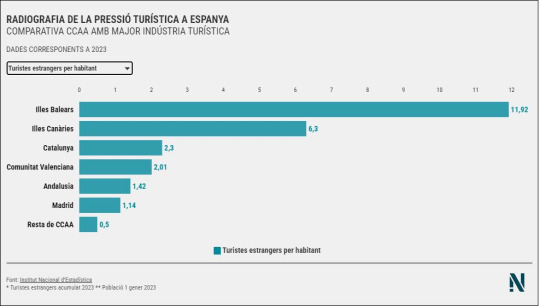
Not only is this system, where tourists get everything they want, killing all the fauna and flora, but locals can't afford to pay rent or buy a house, because landlords are raising prices or turning their properties into Airbnbs.
We regard tourism as a threat to our society. Tourists come and disrespect the surroundings, attending parties and drinking excessively, annoying those of us trying to live our everyday lives. Additionally, rich people profit from mass tourism: they build hotels on protected shorelines, construct golf courses, sell plane tickets at prices that are ridiculously low compared to the cost of housing, and send thousands of cruise ships and planes here each year.
Here you have some examples:
A group of British tourists causes a mass fight on Illetes beach, in Calvià
A hotel company fights to maintain its illegal pools in Menorca while some town halls from some villages, cut the water during a drought time.
There is a Twitter account dedicated to counting all the tourists who jump from balconies and get hurt or die.
Our government is doing absolutely nothing to stop this barbaric situation. That is why, since the outcry, we have launched a fight against these deplorable conditions.
In recent weeks, we have been demonstrating for many reasons, but one of the biggest demonstrations was under the slogan "Mallorca is not for sale", which brought together 25,000 people.

So please, in order to help us,
I BEG YOU TO NOT. TO. COME. TO. MALLORCA.
#mallorca#balearic islands#majorca#menorca#ibiza#formentera#america#tourism#islas baleares#germany#Deutschland#capitalism#anti capitalism#demostration#britain#united states#united kingdom#culture#imperialism#travel#traveling#destinations#airport#airplane#eivissa#spain#spanish#españa#mallorca no es ven#mediterranean
11 notes
·
View notes
Text
I am so over everything right now. I don’t post a ton of personal and real life shit on here but the last few things have been about this goddamn house I rented and the idiot, lazy slum lord flipper who owns it and the fact that there’s so much wrong with it. The last post about it was talking about the slow realization that I had a water leak which was leading to mold and drain flies and shit.
Well, I just got back home after a week of being ousted because they had to demolish part of it and treat the mold and then restore the damage etc.
And I have let the frustration and anger build and finally wrote an email to the property management company about it. So if you wanna read about it the bullshit I’ve had to deal with since August 1st, look under the cut. I’m waiting for a response because of course I sent it and got an auto reply about how they are out of the office after 3pm on Fridays.
I am writing this email in regards to the property at 549 Dresden and the issues there in the past 4 months that I’ve been a tenant. I’ve got a document with every single date and correspondence that I’ve had to initiate over problems at the house. So far, I’ve tried to be understanding and patient and haven’t asked for any concessions but at this point I feel it’s warranted.
As of right now, I have not been able to occupy my house because of the mold issue for 7 days. I was just messaged at 2pm by ServPro that everything was finished. On top of having to find a place to stay during that time, I’ve also lost out on revenue as I have a small business in addition to my main job that I haven’t been able to conduct because I can’t be home. Not to mention the food I’m going to have to toss because it’s been a week (not withstanding that fact that when I did get to the house Friday afternoon to pack a bag to go stay somewhere else, the fridge had been unplugged by Servpro. I have no clue how long it was unplugged and will have to toss EVERYTHING). Plus, I’m going to have disinfect and deep clean all of my clothing, bedding and furniture - basically anything that wasn’t secured in a box or tote.
Adding this to the fact that prior to this I wasn’t able to actually use my shower without the flooding for at least a week before - the leak, although not visible and tangible as it was towards the end with the puddling - was the reason for the insect infestation starting early October. I have the receipt for the UV light I purchased to try and combat it on Oct 12. I also have text messages between myself and loved ones where I discuss the flies and the fact that I was feeling so sick and fatigued and couldn’t understand why. Now after speaking to my doctor, the mold issue was almost certain to be an exacerbating factor if not the sole one.
When I signed the lease I had to email because the place had not been cleaned. While I appreciate the quickness that a crew was sent out to vacuum and clean all the dead flies etc, when I actually was able to move my belongings a few days later, I realized the AC wasn’t working. While trying to determine that I had found the dead mouse. Again, maintenance came to clean that. But from that point it was another TWENTY days I had to wait until the HVAC was rectified - in this case it had to be completely replaced including the units themselves and all the duct work. During those 20 days, nearly all of August the hottest month of year, I had to spend like $80 of my own money to buy fans just to make it sort of tolerable. When I asked the inspector the damage was from mice, he said no. It was just from age and no one maintaining it.
I cannot help but believe this all to be due to negligence at this point. When was this house last properly inspected? I know it was empty for several months based on the info I gathered from Zillow. If it had been inspected properly the mouse, the broken AC and the water damage would have almost definitely be found.
I think with all of this, I am more than entitled to having my rent waived for two months, December and January. If you add the time from August I had no AC, having to buy fans, the weeks of dealing with bugs leading to not having a way to shower to having to be out of the house completely for a week (which your company/the owner would have had to pay for me to be at a hotel but luckily I had someone I could stay with), the health issues it caused, the stress, loss of potential income and the loss of food would probably add up to more than the $2000 two months of rent would cost.
Despite the circumstances and the stress, I do like the house and the area and prefer not to move. When the AC issue was seemingly going to be rejected by the owner, I had to pull out the “Uniform Residential Landlord and Tenant Act” for Louisville Metro to ascertain my rights. I was more than prepared to use any and all legal resources then and will do the same now if I have to, but I wish to remain on good terms with the company and the landlord.
5 notes
·
View notes
Text
Cows remain the untraceable victims of Amazon deforestation

The Legal Amazon’s six meatpacking plants authorized to export beef to the European Union have done little or nothing to adapt to the requirements in the EU Deforestation Regulation, issued by the economic bloc, which will take effect this year on December 30. A new Radar Verde study, shared with SUMAÚMA, shows that none of the exporters – Agra Agroindustrial de Alimentos, JBS, Marfrig Global Foods, Minerva, Naturafrig Alimentos, and Vale Grande Indústria e Comércio de Alimentos (Frialto) – implemented systems capable of controlling 100% of indirect suppliers, that is, the farms selling or transferring cattle from the Amazon region to other properties or intermediaries. Only Marfrig had already begun mapping its indirect chain, with 63% of the meatpacking plants at all of the companies included in the study controlling direct suppliers.
These companies, located in the state of Mato Grosso, have eight meatpacking plants and a total daily slaughter capacity of 5,870 animals. They have just been given extra time to, in practice, keep buying meat from deforested areas. That is because a group of 17 countries, including Brazil, have taken up exporter lobbying and asked to delay regulations that would stop the destruction of forests from being approved by European consumers.
By extending the timeline to implement the European Union’s Deforestation Regulation, each exporter will be able to continue operating in a region where at least 100,000 hectares are exposed to the risk of deforestation. For an idea of what this number represents, imagine tens times the entire area of the city of Paris. Now multiply this area by each of the six meatpacking plants. This is the potential devastation to the forest that could still be jointly caused by these companies in their meat production chains if strict control measures are not taken. Radar Verde’s estimate is conservative and considers meatpacking plants’ area of operation.
On October 2, the European Commission introduced a proposal agreeing to hold off the Deforestation Regulation until 2026, bringing benefits to cocoa, coffee, palm oil, natural rubber, timber, and soybean exporters as well. Large producers, like the meatpacking plants, were given 12 additional months to adapt to the new standards, while small producers have at least 18 more months. Just one symbolic European Parliament vote is needed to approve this decision, which had already cleared the Council of the European Union on October 16. The European Parliament’s vote is set for November 14.
Radar Verde‘s unprecedented study on European Union exports looked at data collected in 2023. The project, which was supported by O Mundo que Queremos and the Amazon Institute of People and the Environment, gives consumers and financial sources insight into which meatpacking plants are in control of and transparent about their production chains, that is, whether or not they contribute to deforestation in the forest region.
“What we’re seeing is an ecosystem of leniency to guarantee that meat contaminated by deforestation continues to be exported,” says Paulo Barreto, an associate researcher at the Amazon Institute of People and the Environment. He says that this system involves everyone from the people deforesting to farms operating in illegal areas and, obviously, up through the meatpacking plants buying their products, financial backers who claim to be committed to solutions, and the government itself, which doesn’t always act with due transparency.
Continue reading.
#brazil#brazilian politics#politics#environmentalism#environmental justice#farming#amazon rainforest#image description in alt#mod nise da silveira
3 notes
·
View notes